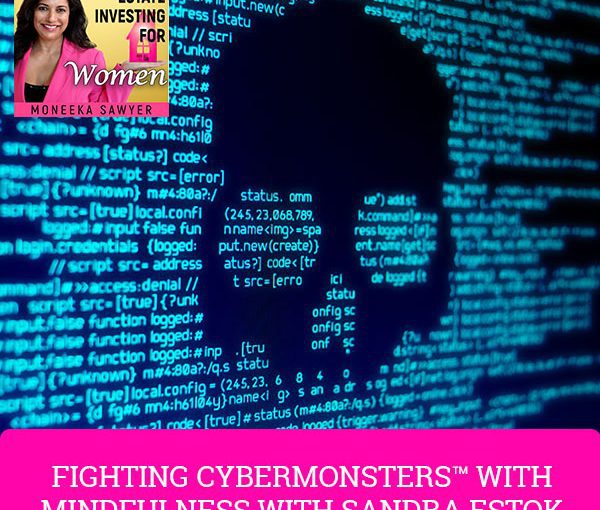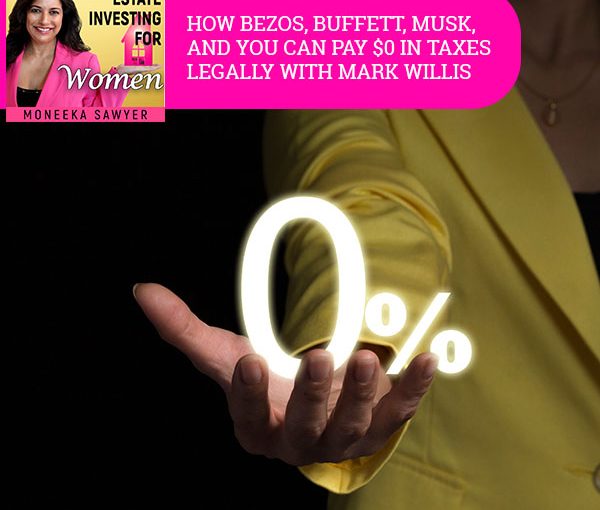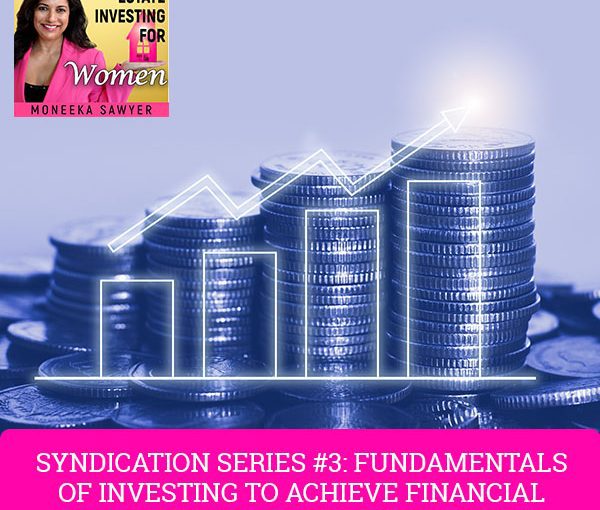Get Unlimited Private Money With Amy Mahjoory – Real Estate Women

Raising capital is an important part of starting a business. And private money is one way to get your real estate investments financed. In this episode, we examine how as Moneeka Sawyer deep dives into raising money with real estate investor and educator, Amy Mahjoory. Amy has helped thousands of real estate investors with private money, walking us through each step. From building relationships to crafting your pitch, Amy lets us have a look at her process. Tune in and learn more about building a real estate business right here.
—
Watch the episode here
Listen to the podcast here
Get Unlimited Private Money With Amy Mahjoory – Real Estate Women
The Golden Rule For Raising Capital
I am excited to welcome to the show, Amy Mahjoory. She is a real estate investor and educator, HGTV personality, bestselling author, and keynote speaker. Her life didn’t start in real estate. After fourteen years in Corporate America, she had her fill working for other people. Although she was a highly recognized global leader in procurement, logistics, and operations management for Dell Computers, she decided that a traditional education combined with the false security of a 9:00 to 5:00 was not producing the results she wanted.
Real estate was the game-changer. She has been investing in real estate over the last several years. During that time, she has raised well over $20 million in private money. As a result of her immediate success, she went on to resign from her corporate job to pursue her passion for real estate. Shortly thereafter, she signed a contract with HGTV and began coaching real estate investors all over the country on the same creative rapport and trust-building strategies, systems and scripts that she still uses in her business now. Here is the best part, all of this can be done without having to depend on friends and family members for private money. This is her new passion and focus.
She helps her students transform their minds so that they can feel confident raising private money. She takes the fear out of raising capital and breaks her systems down into a methodical and easy-to-follow system. Her greatest achievements go beyond what she has accomplished herself. Many people become successful in real estate, but her talent is helping others become successful themselves. She has a genuine interest in helping others succeed. Most of her success originates from her streamlined operations and proven systems. She changes people’s lives. Amy, welcome to the show.
How are you? It’s great to be here with that warm welcome.
This is what I love about you. Your bio is so much more about what you’ve done for others. It’s not all about, “I’ve accomplished that,” because you’ve accomplished quite a lot. It’s pretty amazing. Thank you for that. Can you talk a little bit about your story? How did you transition from corporate to entrepreneurship?
Surround yourself with people on a similar path. Believe in yourself, and you will do great things.
My background is very traditional. Like many people out there, I was raised to go to school and get good grades, get a job at a secured stable company, and collect my paycheck for the next 25 years until I retired. The transition for me was easy because once I realized real estate was my new path, I had goals and was committed. I invested in coaching and mentorship. Where it became challenging was the lack of support from my friends and family members, specifically my dad. That’s a whole other conversation.
For me, I’m a product of the system. A lot of people out there can relate to similar situations and losing friendships along the way. It’s always like, “Perseverance will prevail. Keep your head down. Surround yourself with people who are on a similar path. Believe in yourself and you will do great things.” For me, it was an easy transition because I knew I was going to do it. I was committed to doing it.
Some people are committed but they second guess. I love the power of, “I’m committed, even if my dad doesn’t like it.” Many of us are influenced by our families. “People may not like it. It doesn’t matter. I’m doing it.”
Once you know your role and you’re confident in who you are and what you’re doing, it makes that decision-making process so much easier. At the end of the day, I still have to do what’s right for me and my family while respecting my dad, for example. That’s why I believe so much in coaching. The reason I had so much immediate success was because of my coach. If I didn’t know what I was doing, I worked at the corporate for fourteen years, but they helped me with that fast track to success which was cool.
Talk to me a little bit more about overcoming the roadblocks that maybe family and friends put in front of you. A lot of us women are susceptible to that and experience that.
The hard part for me was I’m very sensitive. I wear my heart on my sleeve and I don’t like disappointing my parents, even as an adult. I always seek out my parents’ approval. I want them to be proud of me. They are now. My dad is my biggest cheerleader now. It was very hard for me, more so losing my two best girlfriends during that transition because I was so excited and passionate. I know real estate can be a game-changer for everyone. That’s why I coach and preach it. They didn’t want to hear it. Until this day, I still believe that I drove them away from me.
It was very hard. I cried for years. Even when I speak on stage, I share this example and I get emotional. However, I’ve also learned that friendships are seasonal. People come in and out of our lives for a reason and their purpose was served. I made a bunch of amazing friendships along the way. I never expected my entire inner and outer circle now to be other real estate investors, entrepreneurs and business owners. Our girls’ trips are masterminds. Don’t get me wrong, I still have my OGs. We have fun and go out. It’s just different.
For me, it’s the same way. When I do ladies’ weekend away, we’re ten real estate investors and professionals in that industry. Not a single one of us is an agent. Just because you’re in real estate does not mean that you need to be an agent. I want to emphasize that again. There are a lot of people in the industry that do a lot of this stuff around what we do. It’s so interesting because I remember when I got started with this show, I’m so passionate about real estate anyways, but it’s always been my side hustle. This is what brought me into this fear of learning more about real estate, expanding my own influence, and also my own learning. That’s why I keep going because I learned so much.

Private Money: Once you know your role and are confident in who you are and what you’re doing, the decision-making process becomes much easier.
Suddenly, I’m having these real estate conversations with all my friends. That’s not what we used to talk about before. People are getting a little bit uncomfortable. I had several friends that were like, “I’m totally inspired by you. I’m going to go get my real estate agent license.” I’m like, “No, that’s not what we’re talking about. We’re not talking about getting another job and not investing and not growing your own wealth, and doing that for other people. We’re talking about this.”
Over and over again, “Don’t get your license. Don’t spend all your time on a license. Go get a mentor, learn to be an investor.” I lost so many friends because they got tired of hearing, “Don’t spend all your time and money becoming an agent,” because I was pretty bullheaded about it. I can see what happens when you spend all that time and money doing that. It does not grow your wealth and freedom. In a lot of cases, it takes away your freedom. Some people want to do that. That’s great, but that’s not the strategy for becoming an investor necessarily. I had the same experience, lots of nights crying because people dumped me.
It’s part of the process and journey. We’re going to have the highs, lows, wins, losses, make money and lose it all. I had this conversation with a girl who was at my LA event. She was like, “I’m going to go get my license,” and I was like, “Why?” She said, “Don’t I need to?” I’m like, “No. Don’t get your license.”
For those of you who may not already know this, there are so many ways where we can still generate referral fees and additional income without being a realtor by referring people to realtors. I always believe in working smarter, not harder. I’m not going to spend time getting a license when I don’t need it to list my own properties. I don’t want to list someone else’s properties because that’s another job to your point.
The other thing is once you have a license, you have to hang it. You’re legally obligated to hang it. You have an obligation now to a broker. That broker is going to have expectations. Every year, you have to do your education to renew and to get your hours. You have to renew your license every four years. It’s been a long time since I had my license, so these numbers may be different and they’re different in different states, but there’s a lot involved in that.
In California and a lot of states, you have to disclose that you’re a realtor, which means you often lose offers because people don’t trust a realtor-buyer sometimes. I found that to be the case for me too. It was a complete hindrance in my business and took all this time and energy. I want to work 4 to 10 hours a month. That was a lot more time and energy that was getting put into my business that wasn’t necessary. Talk to us about your transition to HGTV. How did that happen? What did that do for you?
I did have a goal when I first started to be on TV. I didn’t share it with many people. I wanted my own show. I was in the middle of hiring a virtual assistant. She was 21 years old. I was surprised when she asked me, “What are your short and long-term goals?” I was like, “Who is this girl?” I loved it and appreciated it. I ended up hiring her and I said, “One of my goals is to get on TV,” and by having a voice. I always talk about word of mouth going a very long way. She responds with, “My mom knows a producer at HGTV, would you like an introduction?”
I said, “What show?” She said, “House Hunters,” which many of us know that show. I respectfully declined her offer because I thought to myself, “I don’t want to be on House Hunters. I want my own show.” Two days later, I thought to myself, “Amy, what are you doing? You wrote a book on networking. Get your foot into the door with this lady and see what happens.” That’s what I did. I had a snowball effect. I hit it off. I was on House Hunters. We did a four-part mini-series, but it’s cool because they broke the mold with me.
Everyone you encounter is a prospective private money lender.
In the 12 or 15 years at that time that they had been filming, they had never had an investor on the show. They showed my transition out of Corporate America into real estate on the show. My contractor walked through projects before, during and after. That was cool and it was great for credibility. The relationships, I still have and cherish until this day. I realized I don’t want my own show because it is a lot of work and that’s not a priority for me anymore.
For a long time, I thought I wanted my own show and then I realized there’s this thing. Ladies, this is relevant to you too. How many times are you shooting for something because you think it would be cool? You’re afraid of missing out. You want to have that credibility and whatever it is in your life that you’re looking for that lifts you, but so much that we drive towards is not serving our core values or serving our dreams. This is something that I’m focusing on now on the backside of the pandemic where I’ve been sitting at home for two years. I’ve had so much time to think about, “What is it that makes my heart sing?”
Traveling and speaking, I was gone every single weekend. I remember the year before the pandemic, I was home for six weekends out of the entire year because I was traveling. I miss my husband, my little dog, my family and my life, but I was doing it because it was what was expected, it gave me more credibility, got my voice and message out there, and all of those things, but it wasn’t doing it in a way that supported the bliss of my own life.
As we move forward, I’ve realized, “No, I don’t want a television show. I don’t want to be working that hard. I want to be working hard on the things that are going to reach my goals and are aligned with my own core values and the things that make me happy.” I love that you mentioned that because we can have so many opportunities. Which ones do we choose?
I hear you talking and I hear myself. We were the exact same. That’s the only reason I wrote the book. I wrote this bestselling book because all my friends were writing a book and I’m like, “That’s the next thing to do. I got to beat my friends. I got to be bigger and better.” Now, I love what I do and it’s the only thing I want to do. I’ve cut back on speaking and all these other things. I don’t care anymore. I want to do genuinely what makes me happy, but I also treat it as a business and capitalize on it. How do we do that?
Talk about what you do.
I never thought I would be a nationwide coach showing other investors all over the country how to raise private money. That’s what I do now. I was a leader at Dell, but I was never a manager of people. I was always an individual contributor. When I got into real estate, I never thought I would be hiring a team of twenty people and getting on stage and being on TV. I was super shy growing up. For the first eight years of my real estate career, investors kept saying, “How did you raise all this capital? You must have asked your friends and family.” I was like, “No, it’s the opposite because I’m so stubborn.”
Once they heard that out, they were like, “What list did you buy?” I have never bought a list to target private money lenders. If you have, great. I would love to hear how your experience was. I launched a coaching program a few years ago, once my daughter turned one because I wanted to be a soccer mom. Now, I get to still stay connected with investors all over the country from the comfort of my own home while changing their lives and showing them how to raise capital to get 100% funding for their deals. That’s my main focus now. I’m still an active investor so is my husband, commercial, residential and all that stuff, but now I’m a coach myself and it’s on one topic.

Private Money: We just want to do what genuinely makes us happy, but also treat it as a business and capitalize off it.
The topic that you focus on specifically is private money. I want you to dive a little bit deeper because the very first time that you and I connected, everything you said was like magic. I was like, “That’s so cool.” That’s why I wanted to bring you on. Tell us a little bit more about the private money angle. I know that the way that you approach it is different. You’re not going after friends and family. At least, in the beginning, you opted out of that.
I still don’t because I’m stubborn. If you guys get out there and you listen to podcasts and read books, you take other coaching programs, the majority, if not every real estate educator out there will say, “Raising capital is easy. Go ask your friends and family members.” What if you don’t want to? What if they’re not supportive? What if they’re not in a position to invest? How do we get out there and build rapport and trust with strangers?
I’m talking about your Uber driver, cashiers at a grocery store, people at airports, church communities, sporting events, happy hour, anyone and everyone you encounter is a perspective private money lender. How do we make those mindset shifts? Start planting seeds to open up those conversations to coffee talks where you get them to ultimately invest with you. What I teach is raising capital from people who aren’t even a part of your inner circle. I have students who want to target their friends and family members, and I show them how to have those conversations as well.
I have taken her online course. It’s phenomenal. Ladies, you know that I will not recommend a course unless I’ve vetted and liked it. Many of you asked me, “Moneeka, if you’re only working 4 to 10 hours a month on your real estate business, what’s all this other time? Why are you always so busy?” First of all, this show takes a huge amount of my time because I want it to be the very best for you, but the other thing is I will not recommend anything to you that I have not been through myself.
I take a lot of coursework, not that I need it. I’m not doing this for me. I’ve got my business, but I do love to learn and I do want to get to know the people that I am doing business and partnering with, so I vet their courses. Over the last few years, I’ve vetted twenty courses and only two that I have recommended. It’s a lot of work that goes into that. I’ve never shared this before, but this is what I do. If I’m going to recommend it to you, I’ve been through it or one of you have been through it.
I meet with some of you and you tell me, “I have this great coach. I’ve got a great program.” That’s how I met Mark Willis. Someone else recommended him to me because they loved working with him. You’ve heard from him a few times. A lot of it is recommendations and coursework. Many times, I’ve done the investing with them before I’ll recommend them. I don’t vet everybody that’s on the show and that we do courses for, but I will tell you if I’ve gone through their coursework and I have with Amy. That allows you to feel a little bit more comfortable about the recommendation. I do want to be clear, I don’t vet everybody on the show.
Some of the people out there who know me or many of you who may not know me, I’m raw, real and direct. I’m very approachable and easy to talk to. I am not scripted. It’s a proven system. It’s stuff that I’ve been doing for many years. I’m tested and fine-tuned. If you are coachable and can follow steps, I’ll hand you everything you need on a silver platter, “Do this, call this person, say that. Call me back when they do this.” You will have success and can raise unlimited capital if that’s aligned with your goals. All of our goals are different.
Having money is a good problem to have.
It’s cool because, with private money, there are endless opportunities. You don’t have to flip or wholesale. Buy five rental properties tomorrow with private money. Start a fund and invest in commercial syndication. Invest in a multifamily deal. There is so much we can do. I’ve got mortgage brokers and realtors who learn how to raise capital because all they want to do is generate referral fees for their investor clients. Having money is a good problem to have. Let’s educate people on why they should invest with us.
Do you find that when you raise the money, you should have some idea of where it’s going to go before you raise the money? They’re excited about giving you money and then you stalled.
The answer is no, we do not need to have a deal right now. We don’t want to wait until we have a deal. For those of you who are looking for a deal, whatever your strategy is, we want to be looking for deals and raising money at the same time. Even though I’m telling you that you’re going to raise money from your Uber driver, which is what I did and what you can do as well, it is rapport-based lending. We’re building a relationship and developing trust. You can do this in as little as three weeks, but you don’t want to wait until you have a property under contract. You want to be proactive in that skillset.
You’ve told us a little bit about what makes your course different. You’re talking about not going to friends and family, and doing the fundraise simultaneously. There are some other special things about your course.
I know a lot of big and small name educators out there and nobody teaches private money the way I do. No one teaches how to get creative and think outside the box. I have over 54 different creative trust and rapport-building strategies scripts and templates. My course is a done for you system. I give you all twelve of my credibility pieces, all my contracts, and my list of FAQs. What’s cool about the program is the online portion is eight different modules. Each module is built upon the previous one. In order to have success, you want to come and watch the videos, and do the action items in order of priority because it all means to one another.
I don’t guarantee success and I never will. I have a 90-day money-back guarantee because I can and it works if you follow the system. What’s also unique about my program is I give you lifelong access. Not just to your online curriculum which I’m also fine-tuning and tweaking because I’m still an active investor, but you get lifelong coaching with me that does not expire. I’m not going to call you six months later and be like, “Your coaching is expired. Would you like to reinvest?” That’s it. One investment, lifetime access. It’s a no-brainer.
It’s unheard of. While we’re talking about the course and since you ladies already know a little bit about it, Amy and I are doing a few things together for you. We want to do a webinar. We’re calling the webinar Grow and Scale Your Real Estate Empire with Private Money. We’re going to be doing that together so you can meet Amy, ask questions live, and all of that stuff. If you want to join us, go to BlissfulInvestor.com/PMWebinar. The webinar is going to be held on Thursday, April 7th, 2022 from 1:00 to 2:30 Pacific time. Let’s talk about that a little bit more. What are we going to be covering, then I’ll talk more about the coursework.
My webinars are pretty insightful and eye-opening. People are walking away mind blown, which is cool. We have plenty of time in the end for Q and A so I got you. I always keep it simple and to the point. I always focus on three things. Number one, what is private money? Who are we targeting? Who aren’t we targeting? Where is it? Number three, how do we obtain it? How do we get our hands on it?

Private Money: Follow proven systems, be coachable, and you will have success.
When you understand all three of those points, you can obtain 100% funding for your deals moving forward. This is regardless of your experience, credit, and whether or not you’re doing this part-time or full-time. None of that matters. Follow these proven systems, be coachable, and you will have success. We’ll get into some of those strategies during the webinars, so make sure you guys attend.
Grow and Scale Your Real Estate Empire with Private Money, Thursday, April 7th, 2022, 1:00 to 2:30. Go to BlissfulInvestor.com/PMWebinar. Some of you may be like, “I’m all-in. I want to do the course,” join us for the webinar also. If you want to do that, Amy’s already shared a little bit about the coursework. Do you want to give us a few more details before I give them some links?
One of the first things I have my students do is start building our foundation and getting ready to raise capital as early as module one. One of the key takeaways from module one is what I refer to as our Four-Second Power Pitch. In four seconds, you are going to explain to anyone and everyone, the minute you leave your house, who you are and what you do by dangling that carrot and getting them to ask you more questions about it.
The Four-Second Power Pitch is how I got Larry, a retired physician who was my Uber driver to become my money lender. That’s going to be step one. As we build our foundation, and there are a lot of things that go with building a foundation, how do we start to take action? It’s with your Four-Second Power Pitch. The minute you leave your house, anyone you encounter is a prospective private money lender. What do you say? It’s your Four-Second Power Pitch.
For our ladies that are subscribed to EXTRA, she’s going to give us a Four-Second Power Pitch in EXTRA. In that first module, she’ll be covering that. That’s the foundational building block. That’s where we start. From there, there’s a world of information in the course.
That’s opening up the door to having ongoing conversations with each of your private money lenders. Step two is, how do we take action? How do we find the people to book these coffee talks with? At these coffee talks, what do we even say to them? That’s going to get into all your credibility pieces and all the content that I give you. Don’t worry about what that looks like.
If you are in and ready to go, you can get her course. Go to BlissfulInvestor.com/PrivateMoney. That’s for the full-pay option. Her courses are insanely inexpensive. I can’t believe that she offers all this information for this little amount. It’s a good deal. If you can’t make the full payments right away, you want to do a payment plan, she offers that. She wants to make sure that everybody can get the advantages of this coursework. If you want to do a payment plan, go to BlissfulInvestor.com/PrivateMoneyEasy. Is there anything else you wanted to add?
I don’t think so. It’s a lot of fun. It’s a tight-knit community. It’s like a family. We got each other’s backs. A lot of us develop friendships and end up hanging out outside of our work and coaching environment, but you think about what if you could raise six figures in as little as 21 days. If you can raise six figures, how much more can you raise? What would your business and life look like?
You never know who you’re talking to. You never know who is standing in front of you. Be respectful, and follow the golden rule.
You can sit out there and go read a bunch of books and listen to a hundred podcasts, but why not leverage from my years of experience, lessons learned and mistakes? Stop posting desperately on Facebook groups. I see this all the time. Get the system in place and position yourself as a polished professional poised for aggressive growth. Get out there and do everything you’ve ever dreamed of when it comes to growing your real estate business. You can do it.
That’s the thing. Us real estate investors, what is it that we love? Leverage. Leverage when we’re purchasing and other people’s information. I love that you said it that way. Leverage her years of experience to fast-track yourself. Thank you so much for all that you offered in this part of the show.
It was great being here. Thank you so much for the opportunity to chat with you and your audience. I look forward to coming back.
We got more on EXTRA but before we move on to that, let’s talk about our three Rapid-fire questions. The first one is, what is the super tip on getting started investing in real estate?
Number one is to commit to it and decide that, whether or not it’s for you. Commit and then set your goals up.
What is number two? What is the strategy for being successful in real estate investing?
Once we have our goal, because thoughts expand, number two is to get after it. Get out there and take action. For example, take my Four-Second Power Pitch and start implementing it every single day. Practice it at home. Don’t just sit there and talk about it and do it. That’s why I could do a lot of these implementation workshops. We can sit here and talk about it and take a bunch of notes that you’re going to throw in the garbage, or we can meet up live and start taking action and see results. Just do it.
What is one daily practice that you use that you would say contributes to your personal success?
For me, it was treating anyone and everyone I encounter the minute I leave my house as an equal and specifically private money lender. I have struggled in the past with anger management. I had an anger management journal. I had a very low tolerance for poor customer service regardless of the industry. I’m comfortable saying no. I would go off on people. I would be rude to them if they were rude back.

Private Money: Anyone and everyone you encounter, treat them as equals or better yet, target them as private money lenders.
Once I decided to commit to being a real estate investor and a business owner, I said to myself, “You can’t talk to people this way. You never know who you’re talking to. You never know who is standing in front of you.” Be respectful, the golden rule from here on out. Anyone and everyone you encounter, treat them as equal and better yet, target them as private money lenders. How do you do that? My Four-Second Power Pitch. Everything is very closely linked to one another.
One of the things is that how we do anything is how we do everything. If you have to improve yourself or your business, you’re improving yourself for your life. That’s what blissful investing is all about. It’s who are you getting to become as you’re building your wealth because that’s the person that you are going to be when you’re wealthy. As you improve yourself, you’re treating people with a little bit more respect or a lot more respect whatever. That’s going to show up in every area of your life.
It’s going to show up in how you bring up your children. Our businesses help us to grow. They help us to become a better version of ourselves. I love that example. Nobody has ever admitted something like that on this show but it’s so amazing. Being vulnerable and allowing people to see that we all grow is a perfect example of that.
Thank you. I had a therapy session. I got personal and professional coaches. I’m like all of you. I’m still an investor and a student. All I’m doing with you is sharing the secrets behind some of my success. I’ve had plenty of failures too. What you choose to do with it is on you. I invite you to consider taking action, invest in coaching whether it’s with me or someone else, and start seeing results sooner than later.
Join us for our webinar. You can get to know Amy more. I always love meeting with you, Ladies. I’m trying to do this once a month. It’s like a community. Let’s get together. Several of you come to every single webinar, so I’m getting to know you. I’m loving that. Again, it’s on Thursday, April 7th, 2022 from 1:00 to 2:30 Pacific time, go to BlissfulInvestor.com/PMWebinar. Come join us for that. We’ve got more.
Stay tuned for EXTRA. We’re going to be talking about the Four-Second Power Pitch. You get that for free if you are subscribed to EXTRA. If you’re not subscribed to EXTRA, but would like to be, this might be the time. Go to RealEstateInvestingForWomenEXTRA.com. You get the first seven days for free. For those of you that are leaving Amy and me now, thank you so much for joining us. I always love spending time with you and I look forward to next time. Until then, remember, goals without action are just dreams. Get out there, take action, and create the life your heart deeply desires. I’ll see you soon.
Important Links
- Amy Mahjoory
- BlissfulInvestor.com/PMWebinar
- BlissfulInvestor.com/PrivateMoney
- BlissfulInvestor.com/PrivateMoneyEasy
- RealEstateInvestingForWomenEXTRA.com
About Amy Mahjoory
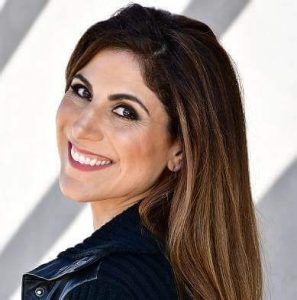 I’m a Real Estate Investor & Educator, Best Selling Author, HGTV Personality & Keynote Speaker who built my business by Networking w/ A Purpose!
I’m a Real Estate Investor & Educator, Best Selling Author, HGTV Personality & Keynote Speaker who built my business by Networking w/ A Purpose!
I am lucky to be able to travel the country, doing what I want – when I want, with who I want.
After building multiple businesses and through many lessons learned, I am able to enjoy my time coaching and mentoring real estate investors all over the country on how they too can grow and scale their real estate business by CONFIDENTLY raising private money!
The most important concept I teach is that with the right attitude, anything is possible.
I was born and raised in the midwest in one of the tightest families you’ll ever meet!
My mom and her two sisters married my dad and his two brothers before immigrating to America and no, none of it was arranged. They decided to buy homes within three miles of one another which is where they raised all of us! Although I technically have one brother, I always say that I am one of seven since I have five double cousins, we all look the same and we grew up within three miles of one another.
After attending undergrad at Michigan State University, I moved away from home for the first time to Austin, Texas where I landed a job working for Dell Inc. After working in Corporate America for over fourteen years, I was doing well, but felt like my true potential was elsewhere. I was completely burnt out and had no passion for the work I was doing. I knew I needed a change.
During my spare time, I was glued to all of those home renovation shows. I absolutely loved the idea of taking an old dumpy house and turning it into something new and modern!
Although it may have sounded a bit ambitious and even unrealistic, especially since I had no previous knowledge of the real estate market, my mind was set! I was on a brand new mission prepared to learn how I too could learn how to buy, renovate and then sell distressed properties.
In my hunt for quality real estate investing education, I found mentors Than Merrill, Paul Esajian and JD Esajian from A&E’s hit TV show, Flip This House. With their ongoing support, guidance and trust, my very first company was born.
______________________________________
To listen to the EXTRA portion of this show go to RealEstateInvestingForWomenExtra.com
To see this program in video:
Search on Roku for Real Estate Investing 4 Women or go to this link: https://blissfulinvestor.com/biroku
On YouTube go to Real Estate Investing for Women
Moneeka Sawyer is often described as one of the most blissful people you will ever meet. She has been investing in Real Estate for over 20 years, so has been through all the different cycles of the market. Still, she has turned $10,000 into over $5,000,000, working only 5-10 hours per MONTH with very little stress.
While building her multi-million dollar business, she has traveled to over 55 countries, dances every single day, supports causes that are important to her, and spends lots of time with her husband of over 20 years.
She is the international best-selling author of the multiple award-winning books “Choose Bliss: The Power and Practice of Joy and Contentment” and “Real Estate Investing for Women: Expert Conversations to Increase Wealth and Happiness the Blissful Way.”
Moneeka has been featured on stages including Carnegie Hall and Nasdaq, radio, podcasts such as Achieve Your Goals with Hal Elrod, and TV stations including ABC, CBS, FOX, and the CW, impacting over 150 million people.
Fighting Cybermonsters™ With Mindfulness With Sandra Estok
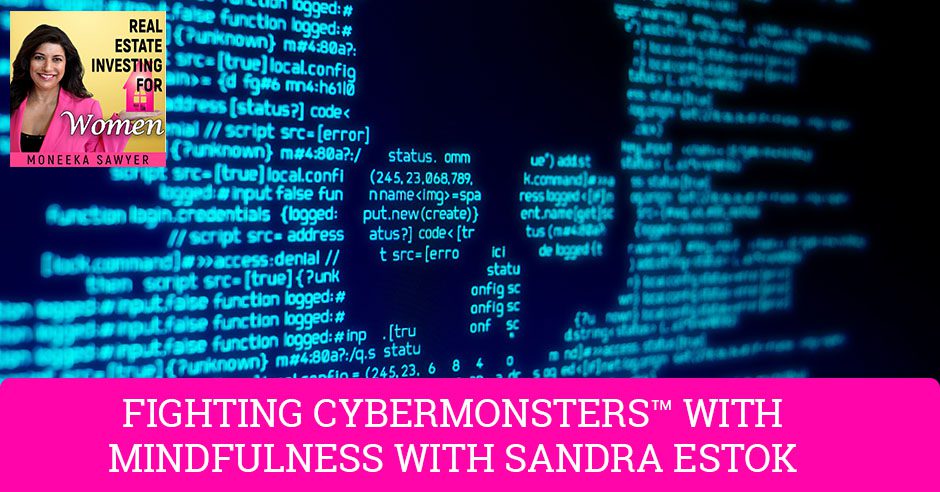
Technology is present in everything you do, which means no one is safe from cybercrime. This is why you need to practice mindfulness because hackers will try every trick to get to you. Join Moneeka Sawyer as she talks to Sandra Estok about cybercrime and cybersecurity. Sandra is the Founder and CEO of Way2Protect where her main goal is to simplify cybersecurity for everyone. She is also the author of Happily Ever Cyber!. Listen to this episode to fully protect yourself from all the cybermonsters™ out there.
—
Watch the episode here
Listen to the podcast here
Fighting Cybermonsters™ With Mindfulness With Sandra Estok
Real Estate Investing For Women
I am so excited to welcome to the show, Sandra Estok. Sandra, Founder of Way2Protect, is a cybersecurity keynote speaker, corporate trainer, and author of the international bestselling series Happily Ever Cyber. Through her publication, Sandra is committed to share her journey, experience and expertise, using simple concepts and inspirational stories to help others protect what most matters to them against hackers, scammers and cybermonsters.
She brings years of multicultural and cross-functional experience in the US, Latin America and Europe in the areas of cybersecurity, IT and data privacy. Sandra has held numerous positions in Fortune 500 companies, private and public organizations. Sandra holds an MBA, Industry Certificate in IT, cybersecurity and data privacy.
—
Sandra, how are you? Welcome to the show.
Thank you so much. I am so excited to be here with you.
This is such an interesting topic. I never even considered having anybody talk on this show about this until I met you. First of all, most people talking about cybersecurity make my brain feel like it’s going to blow up. They are often very boring, which you are not. I see a lot of relevance with regards to real estate. I’m excited about what you are going to be talking about with your relationship to real estate. Before we even get into that, could you tell us your amazing story about how you even got into this?
It started many years ago. I was returning from visiting my mom when I was in Columbia. As we were landing in Miami, the pilot announced that Homeland Security Officers were boarding the plane. I hand in my passport with my work visa. The next thing I know, I’m the only one being marched off the plane and thrown into a room. That room exists in every airport and every country. There is a room. I was escorted there. There are no phone calls. I don’t know what’s happening. My husband was waiting for me in Chicago and I’m about to miss my connecting flight. Ten hours later, they handed back my passport and it was revoked.
I did not know what was happening. A few weeks later, I’m back in Venezuela, where I am from. I have everyone supporting me. I have attorneys. We are in the interview trying to get a new visa. In this interview, the officials kept asking me about China. They were like, “Why were you in China? Who do you know in China? Who is your contact?” I don’t know what they are talking about. I have never been to China. Somehow, a smuggler in China got ahold of my information and has been smuggling women into the US using my identity.
Any industry that has money, big or small, is a target of cybercrime.
I convinced them that I’m not a small smuggler. I get my new visa. I come back home and everything is okay. Two weeks later, I’m returning from Europe. My job was to travel. That was part of her idea at the time. I’m returning. I get off the plane. I get to passport control and I’m right back into the same room because I have to prove that I’m the real me over and over. Every time I travel for six years. When I go, my name and everything was in Chinese. I had the import and export companies under my name. Nobody wanted to travel with me, not even my husband.
Finally, I got my US citizenship, passport and my new name. I changed my name. A year later, I entered the world of cybersecurity after I got my US citizenship. At the time, I did not realize what happened to me. I was like, “This is probably normal.” This was back in 2006. We didn’t have a lot of news about cybersecurity. It was not every day we see it now, back then was not. Being only IT, I did not connect the dots. A year later, I joined and it blew my mind. Understanding the cybermonsters, we can talk about that later, but understanding how it works, what, why, how and who is behind all the cybercrime. It became a passion.
I was in the corporate world for a long time. The more I learn about cybersecurity, the more I got passionate about it. The more I wanted to share that passion differently. I had many different positions and having building a team or building a program and teaching the employees of those companies that I worked for. I discovered that I enjoy that part. It is boring, it is not something appealing. Nothing is exciting about cybersecurity. That is what I want to change because the reality is identity theft or cybercrime can happen to any of us. Unless we know how and what to do, it could happen to any of your audience or you as well.
Many people in my family have experienced identity theft, not cybersecurity and such. It’s a big deal. It happens to so many people. Cybersecurity, we don’t think of it on a small scale. We think of that as that happens to the big companies, those are the targets. I would contend to say that the onesies and twosies, us that’s normal person people or consumers, we are the bigger target.
Forty-three percent of all the hacks in 2021 happened to small businesses. If you think about the industries like the financial industry, healthcare and small businesses. You can include all companies from 0 employees to 1,000 employees. That is usually considered small businesses or 2,000. Forty-three percent of all the hacks happened there. Real estate, your industry, is one of the industries that is impacted because any industry that has money, it’s a target. It’s a good place for hackers to get what they want. It’s either your identity or the way to impersonate you so they can get what they want from you, which in most cases is money.
Talk to me a little bit about how your approach is different from cybersecurity.

Cybermonsters™: The topic of cybersecurity is not appealing. There’s nothing really exciting about it. That has to change because the reality is cybercrime can happen to anyone.
It starts with that realization that cybersecurity is very personal. Everything that we do every day in our lives somehow relates to technology. Why my approach is different is because I’m using that personal connection or stories that we all have and connecting them into the cybersecurity, cybercrime and identity theft world. I didn’t even realize that, but throughout my life, many things have happened to me that connect to cybersecurity in a way.
I’m a cyclist. I do yoga. My identity was stolen, but somehow each part got a connection. That is what I want to share because this is not my story only. The most amazing thing that happens to me when I share either the stories or training is that each person discovers their story. When we start making that connection that cybersecurity becomes personal. It’s not something super technical. I don’t have to be a geek. There are many things we all can do to reduce the chances of identity theft and cybercrime every day. That is the muscle that I want to develop and all of us to start training. When we see it that way, it’s not overwhelming anymore.
Could you tell us the biggest misconception that people might have about cybercrime?
It cannot happen to me because I’m not rich. In real estate, for example, I’m just selling a small house or I’m renting this property. It won’t happen to me. The reality is it can happen to anyone. The amount of scams that happened, especially in your industry in 2021, $149 million were lost in scams related to real estate. There are so many parties involved. In this case, you have a buyer, seller, titles and you have all these many companies. If every person in that chain thinks, “It won’t happen to me.” Unfortunately, if it happens to at least one of those all parties involved, your whole deal could be in jeopardy. That is where the loss happens. The money does not go to the seller, it goes into a different country and you can recover it.
Thinking that it won’t happen to you is one misconception. The second misconception is thinking that it’s all about technology and technical. When we were kids, we learned how to cross the street. We learned how to look both ways. We learned probably not to stick things into electrical outlets. I learned that I should not be doing that. In the same way, if you think about cybersecurity, there are things that are common things that we all can do that can reduce the chances of becoming a victim of cybercrime. The misconception that it is only technology is not true.
When we have a phone call for a deal, you are expecting a transaction to happen in your selling or buying a property. Someone calls you and says, “Your Social Security or any of the information that is related to that property. We are going to validate that. You are going to get the best rate on your mortgage. You are going to have the best deal that you can have for these new investments.” Most of us can recognize that it is a scam, and most of the time, we hang up because they are easy to spot. You know that the IRS is not going to call you. The Social Security surveys are not going to put you in jail.
Most of us have developed that. When we see a call and it’s a scam, we react to it and we hang up. There are many other things like that we will start developing. One common thing is using your password and using one password that has meaning to you. I do yoga and I do all these things. I use a password with an intention and affirmation. It helps me to get centered.
A common misconception about cybercrime is that it’s all technology and all technical. That’s not true.
A password, you won’t think that it could be used in a fun way. You might think it always has to be a lot of characters and boring but you could use that password in a way that has meaning to you. If you are an investor or buying a property and you want a big house on the beach or you have a dream of something bigger for your life, you could use your password in a way that gets you to that dream.
That is a super tip right there. I use that one. My password is also a declaration of how I’m feeling or something that I want for the future. What is funny about that is that normally, you should be changing your password every three months. If it is a declaration or affirmation, it’s fun to change it every three months, too. That is a good security tip is you don’t want to keep the same password for all your accounts. You want to have some different ones that have meaning, but the other thing is you’re wanting to change them frequently. This is a good way to encourage yourself to change them frequently.
A different password for every account is important. I love that you mentioned that. If you get hacked and compromised, you have an account where you have a rental property. You have a password that lets you go into the portals to watch or monitor what that rental property is doing. Somehow, you use the same password for your Netflix account and your Netflix account is compromised. If you are using the same password, your other place where you have sensitive information about your real estate business could be compromised as well.
Using a password manager is one of the best ways to have a very long-phrase with your declaration, but then you don’t have to remember all the other passwords because we have so many other things that we have to do remember and think about. A tool like that allows you to keep track of your passwords and make it easy for you.
Talk to us a little bit more about the password manager. Do you have a favorite? They are going to be a lot of ladies that are reading to this that this is the first time they are knowing it. Tell us a little bit about what that is.
A password manager is a tool and there are many different types, either free versions or paid versions. When it comes to something that protects my password, I would feel more comfortable paying for a service that I know is going to have a more secure solution. This is where one thing that I will caution on free, however, if you are an Apple person, there is a password manager that is embedded into your iPhone or iPad. It is part of the iOS system. There are many other versions and companies that do this. This is their business. A password manager is a tool that you will integrate all of your passwords that are associated with your email address.
If you are using five different email addresses, you can put it into your password manager and it will scan every word you have a password and it will bring that information to you. The good thing is you have a dashboard and you have a tool that will tell you where you repeating the same password. When was the last time you changed that password? How strong that password is?

Cybermonsters™: Cybersecurity is very personal. Everything that you do in your life somehow relates to technology.
One simple password of seven characters can be broken in less than point .29 seconds. A password manager allows you to have that phrase, your big declaration, inspiration or affirmation. You change everything once you achieve that declaration. It’s one more tool that you can use because you have to type it so many times. I say that phrase to myself every day, “My password makes me happy.”
Do you have a password manager that you particularly like that you might recommend?
I use Dashlane. It’s one of them, LastPass or 1Pass. What I like about that one is it includes a VPN. It’s a way that makes your connection more private. Think about you are going on a highway and when you are on the internet, there are no roads. All the cars are everywhere. When you are using a VPN, it’s like you are on your own freeway. All the information you are sharing goes only through that tunnel or lane that you are going through. Nobody can enter your lane. Especially in real estate because you do so many transactions that are very important with money.
I will suggest when you do those transactions, you activate your VPN. There are either antivirus tools that will have a VPN included or a password manager will have it or you can have a VPN on its own. Every time you do a sensitive transaction, what I recommend is that you use that VPN service because that way your information cannot be taken. Let’s say you are in a public place and using public Wi-Fi. Unfortunately, when you use public services in the same way you have access to those public services, cybermonsters, hackers or cybercriminals have also access to that.
Even if you are sending a simple email, they can intercept that information. Why is that important for your business and real estate? You are buying or selling a property. You are connecting with your buyer or seller and you are interchanging emails. If I am in a public place and I saw that house went for sale because it’s all public records. It goes to the MLS, you see that. I can start watching the communication between the two parties. When I intercept that information, I can know more details when that close is going to happen.
As that date approaches, this is one way the scams have happened is that the person that is supposed to transfer the money receives an email with fake information on the account, but you are seeing it real because it is impersonating that other person. You talked with that person. If I’m watching your email, watching how you communicate, what language did you use and how do you greet each other, it is easier for me to impersonate that agent, lawyer or person and send you a bank account that it’s not real. It sounds like a movie, but if you search online, you can see how many people have fallen for this. In real estate, many people have lost all the money because it went to a foreign country and it cannot be recovered.
In EXTRA, you are going to be talking specifically about how to protect your email. Ladies, make sure that you stay tuned for that because this is a horrifying story. Are there some other basic things that we can do that can help us to protect ourselves?
You’ll use your password every day, so choose one that’ll make you happy.
I love your show because you have a lot of guests that always are bringing positive, good vibes and there are many different topics. One topic that comes to my mind, which is connected to cybersecurity is mindfulness. If I’m going to do an email, go into social media or do this deal I’m practicing mindfulness and less at the risk of becoming a victim of cybercrime. Something that simple as being present when you do your work can be a game-changer for identity theft or cybercrime.
Give me an example of that. I’ve got about ten that I can give you, but I’m sure you’ve got some good ones.
I love to know yours, too.
Frequently, you will get something that says in your email, “It’s time for you to change your password. Please press this link.” You have to put in your old password and you have to put in a new password. If you look at the page that it goes to, it is not the actual page where you are changing the password. It was masked and it’s different. That is one.
Don’t ever put in a password unless you go to the site. Use yourself, go to that site and change the password there, don’t do it through a link that is sent to an email. The thing is that sometimes we are moving so fast, we are like, “I got to get that done.” You get it done. You move on and then you’re like, “I gave somebody my password.” You go through and you have to change all your passwords. That is one of them.
Another one is entering your email address for a similar situation. You are asked for your email address so that they can send you a verification, but you sent that email address to someplace that is not where you thought and suddenly, your email has been completely hacked. Those are a couple that I know my husband and I have experienced. How about you?

Cybermonsters™: Practicing mindfulness can put you less at risk of becoming a victim of cybercrime. Being present and aware when you work can be a game-changer for identity theft.
Congratulations for being attentive to all of those. Good job on keeping an eye on those emails or those things that can happen. I can give you one example that has happened a lot. It is related to when you do your banking. Most banks will have two authentications or a two-way to verify that you are you. They send you a text message and they say, “Someone is trying to get into your account. Is this you?” Even if you are not trying to get into your account. When you have to sign up for your banking, you will ask to validate that you are you and it will require a PIN that you have to enter to say that is you.
One way that cybermonsters check you out is they will try to impersonate you. There is a lot of information available to all of us for data breaches or hacks. They call the bank and they try to log in to your bank account like you. They are not going to have that PIN. That PIN, they are going to request the bank to send you a new one. When you go to your online banking and you say, “I forgot my password.” It will email or text you that validation. That scammer or cybermonster will call you and say, “We are from this bank. We sent you a verification code.”
You will be surprised how many people didn’t read the entire text. That is a request for your password to be changed. You give that PIN to the person that is calling you to validate. In some cases, they call you and say, “We are seeing transactions in your account. We are going to stop the hacker.” They are pretending that they are saving you when in reality, they are hacking you. Mindfulness is going to so many levels because whatever situation you are in, my advice is don’t take an action. Breathe.
If it is your bank that is calling you. What I will do is I hang up and I take my credit card number or I have my contacts in my bank and I will call them directly. Whatever it is, you can have a few seconds where you can breathe and then think about, “What actions do I have to do?” Call the bank. Call whoever you need to call and validate that the information that you are receiving is valid.
What I love about what you said is often, we will get a phone call from our bank or credit card company, “Is this charge valid? Are you in this location?” We think, “This is an authority. This is the bank. I don’t get my money unless I cooperate with the bank.” What you said is it may not be the bank. It’s okay to say, “Hold on. This is not a great time to chat. Let me call you right back.”
You hang up and you call the numbers that you know. It’s the same thing as verifying where you are putting your passwords online. Make sure you check the URL. I have never done that before. That’s amazing. You can say, “I’ll call you right back or this connection is not good.” You don’t need to be rude, but you do need to take a couple of more minutes. This is going to be more time out of your schedule, but is it worth it?
If you think about that for a few seconds, it can save you. In my case, six years from the nightmare. If you put it into perspective, how much can you lose for making that extra phone call and whatever transaction you are doing, validating what it is that you are doing?
Pick three things you care about the most. Know what matters most to you and start there—no need to overwhelm yourself.
Tell my ladies how they can reach you if they want more of this good stuff.
They can visit me at HappilyEverCyber.com. They can get in there. I have a gift for them. It’s the three critical but super-simple steps they can take to start protecting their information. They also have access to download a checklist. I did this checklist with all the years working in cybersecurity, data privacy. I incorporated all the things that at minimum, we should be doing to keep ourselves safe. I love for them to get that information. You don’t know, something that you have never heard before or you don’t know how to do it, do not worry because what I am committed to do is to develop content. My book is a book series where I will be creating books that are more specific about different areas.
A book only about social media and how to protect your identity, passwords or computer. You can’t protect everything. You have to know what matters most to you and start there. Pick three things that you care about the most. When you protect those three, you can pick another three and another three. You don’t have to overwhelm yourself with, “I got to do all of this.” That is the misconception that I want us to acknowledge. Don’t let the cybermonsters hack you. Start taking the action to end that. When we are training, you don’t start with a marathon. In the same way, that is how we are going to build a muscle and to make it as easy, fun and relevant to what matters most to you as possible.
The thing that comes to mind for me is technology is changing so fast. What was relevant in the past is not relevant now. Do you feel with regards to cybersecurity, things are constantly evolving and what we need to do changes? Do you feel there is a baseline of things that we need to do and then we can improve it later by working with a professional like you? Is it always changing? Is this something I constantly have to be thinking about and be aware of?
The answer is both. Things are always changing, but there are many things that when we don’t take care of the basics, that’s when we make it easy for cybermonsters to get into our lives. If you are in your house and you see holes in the walls of your house. You get up the next day and see another hole. People can sneak through any of those holes and show up in my living room where my kids, family or business is. When we see all of that, most probably, we will take action right away and close those holes. In the same way, when we don’t update our computers and our phones, they have holes in the programs or operating systems.
Those are the holes that cybermonsters take advantage of. If you are using a computer and you never update it and that is one basic thing. No matter how new technologies come and your refrigerator is talking to you, if you don’t do that basic thing, which is updating your devices and computer, you are leaving with open holes that allow cybermonsters to break in easily. It is both. New technologies are here and cybermonsters are always looking for ways to break in and to innovate, but at the same time use technology and we don’t do the basics, we will make it easy for them.
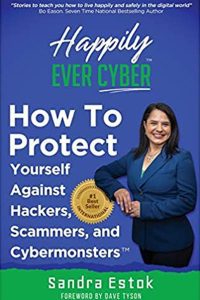
Happily Ever Cyber!: Protect Yourself Against Hackers, Scammers, And Cybermonsters By Sandra Estok
We are going to be talking about email in EXTRA. I’m excited about that and how to avoid the situation that you talked about where there is a transaction, the emails get intercepted and our money goes somewhere that it should not be going. I’m sure there are many other examples, but that’s a good one. Before we close the show, are you ready for our three rapid-fire questions?
Yes.
Tell us one super tip on getting started in real estate investing.
Be passionate. If you are going to invest either being a buyer or having a business, make sure that is your passion. When that happens, you will breathe, dream and live for that. There is no better feeling than being passionate about and doing what you love to do.
What is one strategy for being successful in real estate investing?
If you are a beginner, have someone that can guide you through your journey. In my case, I have so many mentors and people helping me through the process. Whether in real estate or business, I always seek someone that knows what he is doing. I’m buying and selling a house, so I will never do it without the help of experts because this is what they do and they can learn if that is my passion. If it’s not something I want to do, I want to do it right. Always seek someone with that expertise that can take you much faster to wherever you want to go.
Always find somebody that can get you faster to the place that you want to go. That is so good. I love that. That is a good soundbite. What is one daily practice you do that contributes to your success?
Gratitude. There is not a single day that I wake up and I am not grateful for another day. Grateful for another opportunity to play and serve. Even in the tough moments, when you are not happy, something didn’t go right, I use gratitude. It is amazing how fast I get off whatever negative emotion I have and how much clarity I get even if the situation was tough, how much I understand that it was for good that it happened that way. I am always grateful for everything.
Thank you so much for everything you have offered on this portion of the show. I can’t wait to talk more in EXTRA, but thank you so much.
Always find somebody that can get you faster to the place you want to go.
Thank you. My pleasure. Remember, practice mindfulness. Be present and that alone will help you so much to reduce the chances of being a victim of identity theft for cybercrime. It makes you enjoy much more of what you are doing, which is investing.
If you are subscribed to EXTRA, stay tuned. We are going to be talking about how to protect yourself in the email. This is that thing that we use all the time, every day for everything we are doing right. It makes us vulnerable in certain ways. We are going to be talking about how to reduce that vulnerability in your email in EXTRA. This is relevant for everybody. If you are not subscribed to EXTRA, go to RealEstateInvestingForWomenEXTRA.com and sign up. You get the first seven days for free.
Get this EXTRA and find out how to protect yourself. You could read to as many as you like in the first seven days. If you love it, then you stick with it. If not, you can unsubscribe, no big deal. For those of you that are leaving us, thank you so much for joining us. You know how much I appreciate you. I look forward to seeing you next time. Until then, remember, goals without action are just dreams. Get out there, take action and create the life your heart deeply desires.
Important Links
- Way2Protect
- Happily Ever Cyber
- Dashlane
- LastPass
- 1Pass
- HappilyEverCyber.com
- RealEstateInvestingForWomenEXTRA.com
About Sandra Estok
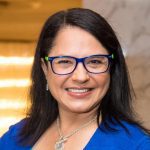 Sandra works with organizations to increase their cybersecurity programs’ efficacy by making the content relatable and personal. As a result, companies can increase engagement and awareness of their first line of defense again cyber threats: its people.
Sandra works with organizations to increase their cybersecurity programs’ efficacy by making the content relatable and personal. As a result, companies can increase engagement and awareness of their first line of defense again cyber threats: its people.
She utilizes her journey combined with her 20 plus years of experience in the Cybersecurity, IT, and Data Privacy industries to empower your teams to take charge of their cyber safety. Throughout her career, Sandra has held numerous positions in Fortune 500 companies in the United States, Latin America, and Europe in private and public organizations.
Sandra is the author of the international bestseller and award-winning book series Happily Ever Cyber!™ and the Cyber Literacy Series for children. In addition, she is a keynote speaker and corporate trainer. Her latest project, the Inner Cyber online course, combines a unique, purposeful, and long-lasting way to adopt a cyber safety-focused lifestyle.
Love the show? Subscribe, rate, review, and share!
______________________________________
To listen to the EXTRA portion of this show go to RealEstateInvestingForWomenExtra.com
To see this program in video:
Search on Roku for Real Estate Investing 4 Women or go to this link: https://blissfulinvestor.com/biroku
On YouTube go to Real Estate Investing for Women
Moneeka Sawyer is often described as one of the most blissful people you will ever meet. She has been investing in Real Estate for over 20 years, so has been through all the different cycles of the market. Still, she has turned $10,000 into over $5,000,000, working only 5-10 hours per MONTH with very little stress.
While building her multi-million dollar business, she has traveled to over 55 countries, dances every single day, supports causes that are important to her, and spends lots of time with her husband of over 20 years.
She is the international best-selling author of the multiple award-winning books “Choose Bliss: The Power and Practice of Joy and Contentment” and “Real Estate Investing for Women: Expert Conversations to Increase Wealth and Happiness the Blissful Way.”
Moneeka has been featured on stages including Carnegie Hall and Nasdaq, radio, podcasts such as Achieve Your Goals with Hal Elrod, and TV stations including ABC, CBS, FOX, and the CW, impacting over 150 million people.
How Bezos, Buffett, Musk, And YOU Can Pay $0 In Taxes Legally With Mark Willis – Real Estate For Women
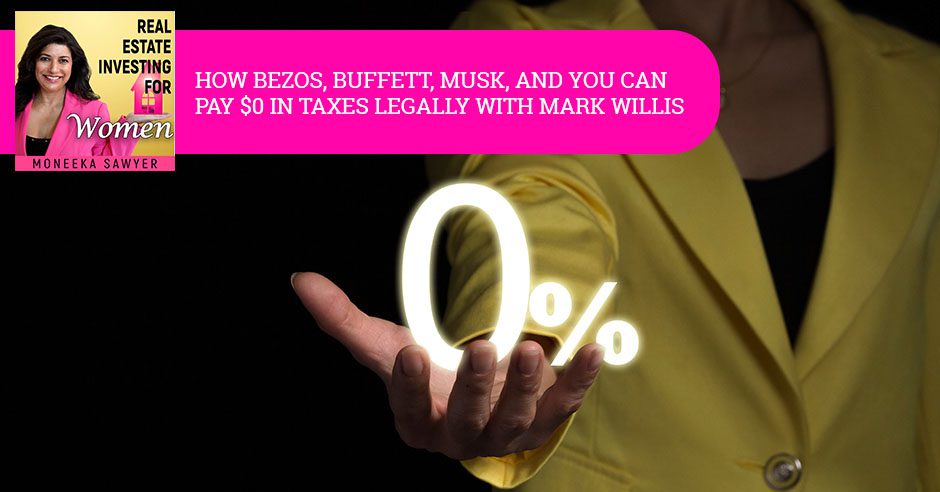
Taxes take a lot from you – your finances, your time, and your energy. What if you’re told you can legally pay zero in taxes today? Believe it or not, there are ways you can enjoy retirement freely without worrying about the IRS. Mark Willis is a man on a mission to help you think differently about your money, your economy, and your future. Mark is a certified financial planner, a three-time number one bestselling author, and the owner of Lake Growth Financial Services. Mark joins Moneeka Sawyer to talk about how you can grow wealth in ways that are safe so you can enjoy tax-free income in retirement. Listen in as Mark shares how you can become your own source of financing so you can have financial control over your future.
—
Watch the episode here
Listen to the podcast here
How Bezos, Buffett, Musk, And YOU Can Pay $0 In Taxes Legally With Mark Willis – Real Estate For Women
Real Estate Investing For Women
I am so excited to welcome back Mark Willis to the show. You’ve heard from Mark several times on this show. We’ve even had webinars with him. He’s shot me an email and said, “I’ve got this new strategy. It’s called BBD.” I’m not going to tell you what that is. I’m so excited to share this strategy with you and include you in this conversation.
Before we move forward with BBD, let me reintroduce Mark to those of you who have not met him yet. Mark Willis, CFP, is a man on a mission to help you think differently about your money, your economy and your future. Mark is a certified financial planner, a three-time number one bestselling author, and the Owner of Lake Growth Financial Services, a financial firm in Chicago, Illinois.
As cohost of the Not Your Average Financial Podcast™, which I’ve been on, he shares some of his strategies for investing in real estate, paying for college without going broke, and creating an income in a retirement that you will not outlive. He works with people who want to grow their wealth in ways that are safe and predictable, to become their own source of financing, and to create tax-free income in retirement. That’s all very exciting. It’s no wonder I always want to have Mark on the show. Mark, welcome back to the show.
Thanks for having me. I’m excited to see what we do here together. It’s always fun to see what sort of magic we can create together.
It always is magic. We were having a conversation before in the green room about this idea of the new year, and you had a question for me. Could you remind me what that was?
I had been tuning in to your show like all smart real estate investors should be tuning in to your show. In one of your episodes on the very first day of 2022, you brought up a theme or an inspiration toward this year that we’re living in. There was a theme of matching the masculine and the feminine together. Maybe you can speak more eloquently about this than I could.
The world has been so masculinely dominated that even women feel the need to do business as men.
2022 is year six. I studied Numerology many years ago. It’s a very Indian thing to study Numerology. It’s where it came from originally. The six stands for balance. Specifically, the balance between the masculine and the feminine. In year six, what happens is this energy of melding the masculine with the feminine comes into the energy space of the planet. What’s so fun about that is because our world has been so masculinely dominated, even as women, we feel we need to do business as men, this is a year where that balance happens both for the men or the women if we’re able to focus on it. It’s easier to bring that closer.
This is one of those years where we women can step forward in our power. I am not a feminist who says, “Up with women, down with men.” I have never ever been that person. For me, we both need each other. We all need the masculine and the feminine because they’re both parts of who we are. Women by default experience more of feminine characteristics than masculine, but as you said in the green room, we have both. The true bliss and massive success in life happen when you’re able to plug into the resources of both of those, and this is a year for us to do that. Does that make sense?
It sure does. There’s a little island in the Nordic countries where the men would go out and fish all day, every day. The women ran all the businesses in town. It was all women-owned businesses. Globalization happened and all the men were put out of work. The women run that whole town now. They run the whole island. They’re the mayors, the politicians, the bakers, the candlestick makers, all that. The point is we need each other. We need each other for these times when the unexpected happens like globalization or a pandemic to help us learn both masculine and feminine in our lives and in our work.
They bring different resources. We bring different skills and different talents, so it’s a big advantage if you can plug into both, and this is the year to do that. Women, step forward in your power. Claim the feminine along with your masculine. Thank you so much for asking that question. Let’s get back to you. First of all, tell us what BBD stands for because it makes me laugh, and then let’s talk all about why are you bringing this forward to your clients and out into the world?
Tax-Free Wealth
I’ll only tell you and the audience what it stands for if your audience promises not to unsubscribe as soon as I say what it stands for because it’s a little off-putting. The BBD stands for Buy, Borrow, Die. You’ve got to listen a little more to get some context here. Let me ask you, what if you could build massive amounts of wealth and never pay taxes? We’re going to guide you through these three steps to invest completely tax-free even when you’re taking cash out of your investment and you’ve got cashflow to fund your lifestyle here and now, but also in the future in retirement. If we think taxes are even going to be the same or even certainly higher than they are now, this is going to be a very important show for anyone wanting to build wealth.
Let’s dig in. Mark and I are friends now. We’ve been working with each other for a long time. We spent all this time in the green room, and then he suddenly told me, “I got to be gone at this time.” I was like, “We got to go fast.” I’m going to let you jump in there and I’ll ask questions as I go along the way, but why don’t you take it away so that my ladies get all the information that they deserve on this one?

Zero Taxes: All of these incentives are like dancing with your partner, the IRS. You want to avoid stepping on their toes, but not run away from the dance party.
Thank you. You’ve done such a great job with your show. I will get right to things here. ProPublica, which is an investigative newsroom, obtained a vast trove of IRS tax data on the wealthiest Americans. It covered more than fifteen years. This data dump, leak or whatever you want to call it, provides an interesting look into the true nature of America’s titans like Warren Buffett, Bill Gates, Rupert Murdoch, Mark Zuckerberg, and Elon Musk to name a few. It provides an interesting look at not just their income number, which is astounding, but also how they avoid legally any taxes on their investments, stock, trades or gambling winnings.
In 2007, Jeff Bezos didn’t pay a penny in Federal income tax. He did it again in 2011. In 2018, Elon Musk also paid no income taxes. Michael Bloomberg did it in the last few years as well. These are legal and perfectly legitimate ways to avoid paying taxes, not evading, that’s a clear distinction there. There are ways to do it that are well-known and established fundamental parts of the IRC or the Internal Revenue Code. As I say this, my guess is your audience has 1 of 2 responses. They might either say, “How could they do that?” out of anger. They might also say, “How can I do that?” out of curiosity. I hope it’s the latter. There are reasons to have both sides of that conversation.
This is not a political episode, I promise. The goal will be to teach your readers a little bit about how this happens. Most Americans pay income taxes on their paychecks. Most Americans do live paycheck to paycheck, so we’re paying the highest tax rates on the vast majority of our earned income. In fact, the 25 wealthiest Americans only paid 3.4% of their income tax whereas the average American or the median household paid 14%, and the highest bracket is 37% tax. That’s something interesting that the wealthiest are paying 1/10 as much as us mere mortals with earned incomes. What are your thoughts so far?
I do have a quick question. Thank you for that. Clarify avoid versus evade. That’s very important.
The Internal Revenue Code was established in 1913, which is an interesting year because it’s the same year the Federal Reserve was created. Before we had the Internal Revenue Code of 1913, there was no income tax at all. Starting in 1913, it was there to pay for covering the cost of World War I and beyond. It was there to establish itself permanently after World War II. In the 1950s and 1960s, it became a series of incentives for us to follow. It’s sort of a psychological experiment, but in many ways when you think about it, why does the government tax you at all? It can print its own money. Let that sink in for a minute. Why does it need our tax money if it can print endless amounts? That’s interesting.
We can’t pay our taxes in Bitcoin or rubber chickens. We have to use US dollars. That’s the one thing there’s an infinite supply of at and at the US government, so why do they tax us? Part of it is to get us to do certain things like buy a house, have children, start a business or invest in real estate. All of these incentives are dancing with your partner, which is the IRS. If we can avoid stepping on the IRS’ toes in this dance and not evade, because we’re not running from the dance. That’s where you end up in jail. You got to dance with this dance partner. As the old saying goes, “You got to dance with the devil who came with you.” We want to avoid stepping on their toes but not run away from the dance party.
Massive success happens when you’re able to plug into the resources of both masculinity and femininity.
I love the analogy of the dance. Thank you for that.
Buy
Guys and gals, get out a sheet of paper and write down three words for me. The words are Buy, Borrow, and Die. Each of these steps represents a key feature to the IRS Tax Code in the American Tax Law, and where you can live totally income tax-free if you do it right. Let’s talk about each one. The first is buy. You’re supposed to buy assets. Buy an asset that goes up in value. Let’s say you buy a piece of real estate or stock, but it has to be an asset that does not produce cash. It cannot produce cashflow, which is an anathema to us real estate investors. If you’re going to buy an asset that produces cashflow, that’s going to generate an income. That income is taxable.
The buy step works because we’re realizing appreciation but we’re not experiencing an income flow. This would not be your typical mutual fund or a dividend-paying stock. Warren Buffett’s stock, Berkshire Hathaway, hasn’t paid a dividend since 1965. How is that possible? They’re very profitable as a company, but they haven’t paid dividends. Why? It’s so that Warren and his team do not have to realize any income on their income taxes. There are a lot of examples of how much he would have had to pay in terms of his taxes. Multiple billions of dollars of taxes would have been paid if Berkshire Hathaway had paid a dividend. The first step is to buy assets that go up in value that do not generate an income.
Borrow
The second step is to borrow against that appreciating asset. You’re supposed to buy and then borrow against it. Strangely enough in the IRC, loans are not considered income. Any kind of loan you receive whether it’s a credit card, mortgage or business loan is not considered income when you simply borrow money. That’s true whether it’s a credit card or borrowing against highly appreciated stock like Elon Musk does. In fact, he was jostled by Elizabeth Warren because he was not paying his fair share. I’m going to stay away from that conversation and tweet-storms that Elizabeth Warren and Elon Musk might have had. Her basic complaint was he was taking all this income but he’s saying, “I didn’t take income. I simply borrowed against my Tesla shares.”
He said if Tesla was to go down in value, he would immediately and instantly go bankrupt, which is an interesting statement to say from the richest person in the world. Borrowing against your appreciating asset allows you to live with no taxes due. That’s how you’re able to buy your groceries, gas, or in Elon’s case, your tenth yacht, and gives you a chance to live on that without experiencing any income tax. Do you have any thoughts on number one or number two so far?
One of the things that I want to emphasize is we can all borrow on our stock. It’s available to all of us. We can also invest our portfolios on margin with this 50% leverage, which is also borrowing on the value of the stock. You can do those things. However, the stock market is extremely volatile. When you do those things, when you borrow on your stock or go on margin, you have the situation which Elon talked about, which is if the stock goes down, there’s a call on that loan or margin.

Zero Taxes: If you’re going to buy an asset that produces cash flow, that’s going to generate an income and that income is taxable. So, you’ll want to buy an asset that does not produce cash because then you’re realizing appreciation, but not experiencing an income flow.
This is what happened. I believe it was 2001. Many people had so much stock that they had gone from the boom. They had all these options, and now those options had exercised them, but their value was down, so the brokerage firms called them on it because they were out of money. All these people had to sell their homes, go into foreclosure or file bankruptcy. That’s what happened in that part of the financial crisis back then.
When you’re looking at stocks, you have this volatility that you have to deal with. That’s why I love real estate, because first of all, your leverage is you’re putting 1/5. You got five times the leverage rather than double, and you cannot get called on. Banks do not want to own real estate. If the market plummets as it did in 2007, 2008 and 2009, the banks are not going to call out those loans.
That’s a situation where if you can manage to continue to pay your mortgage, you’re in a good market, and the market is going to rise so that your property values will recover, it’s a situation where you can stay in. You never get called and you never go bankrupt or lose your shirt because you’ve taken a loan on a hard asset, and then that hard asset stays a hard asset. They’re not going to call your loan on it unless you stop paying. That’s a big difference in what kinds of loans you’re taking. There are many other kinds of loans. Those are just two examples that Mark gave. I wanted to highlight the differences there and why I love real estate for this sort of thing.
That’s so true. Not to point out political figures, but Donald Trump is a great example of doing exactly this. Regardless of his politics, that’s one wealthy guy or he claims to be anyway. He used it off the back of the real estate and borrows against it for his lifestyle, needs and otherwise. It’s not like he’s flipping burgers at McDonald’s to make his income. You’re exactly right.
The other piece to that puzzle is no income tax is due when you borrow that money. Let’s say you earned $1 at your day job flipping burgers. You might end up with $0.70 when you walk home due to the taxes due on that $1 that you earned. When you borrow $1, you get 100 cents, and you can use that for additional investing, buying your groceries, your yachts or whatever you might want to do with your money. There’s an efficiency standard there when you say borrowing against an asset versus earning income to do it.
You bring up a great point that there is an inherent risk. Even the wealthy understand this. They understand that they could possibly go belly up. If you think about Mark Zuckerberg who had to buy into the strategy. He had to pay billions of dollars in 2013. He paid between $1 billion and $2 billion of taxes in that year alone to buy his ticket. To get on this Buy, Borrow, Die train, you have to buy your ticket. That’s another key element to this BBD strategy. You got to make sure you’re getting on the train. Once you’re on the train and you’ve paid your dues to society with these massive tax bills, you now have this highly appreciating asset that’s growing in value.
Women, step forward, gain your power, and claim your femininity along with your masculinity.
Whatever happens to Facebook stock, Meta stock or whatever they want us to call it now, it will continue to go up and down and he’s got that risk where it might plummet. There’s nothing guaranteed about Facebook or Metaverse stock. In the meantime, borrowing against that asset is a tax-free way to do it. I truly think that even if he was to pass away, which I don’t want to give away the farm here for letter D, he can give that highly appreciated asset to his children, and then the gain continues. The grandma or grandpa does this, and the kids and grandkids get to stay on that train as long as they’re able to keep that wealth and not sell those stocks.
Die
There are a couple of things that come up for me on this. The first thing is I have never recommended borrowing to live your lifestyle. I’d love to address that if we got the time. The other thing is you might be thinking it’s appreciating. Eventually, you have to pay capital gains on that. That’s where the die piece comes in. The tax laws now are very favorable where your basis goes up to when that person died, so your taxes get completely eliminated from that appreciation. We’ll get into that a little bit more in EXTRA because we want to talk about the die piece. We’re not going to die. We’re not going to talk about the morbid subject of dying, but to give you clarity more on how this whole thing can work. Can you address the whole thing about borrowing for lifestyle stuff?
Yes. I’m playing a little bit of devil’s advocate here because I don’t recommend that your Average Jane or Average Joe does exactly what we’re talking about on borrowing against your stock account or borrowing heavily for consumer purchases, for example. I agree with you, Moneeka. In fact, I specifically specialize in an asset class that has no risk for loss. It builds and grows on a guaranteed basis every single day, every single year. The asset of whole life insurance grows on a guaranteed basis every single year, and there’s nothing that we can do to stop it in times of good, in times of bad, the market crashes, the market is booming.
A whole life insurance policy of all things in the financial universe grows on a guaranteed basis. Interestingly enough, the cash value does not automatically spin-off income, so it meets the criteria of not churning out an income. You can borrow against the life insurance cash value. When you borrow against the life insurance cash value, it continues to grow. The life insurance cash value will continuously compound and grow uninterrupted like a house but guaranteed.
If I’ve got a house worth $500,000 and I use a HELOC on my house to go invest in another real estate deal, people sometimes do that. I’m not saying it’s a good idea or not. For all people, it’s certainly not, but sometimes it works. Now your money is doing two things at once there. Your house is still growing as if there was no HELOC. Zillow doesn’t care if we have a HELOC or not, but we also use the HELOC money to go buy this other real estate deal. What could possibly go wrong? See reference 2008.
As long as you can hold it, you’re okay.

Zero Taxes: It’s not considered income when you simply borrow money. Borrowing against your appreciating asset allows you to live with no taxes due.
That’s right. As long as you can hold it and pay those HELOC fees and everything, you’re okay. The risk of going underwater with a whole life policy is zero. There’s no way to go underwater with a life insurance policy because it continuously compounds. You can lapse a policy but the worst that could happen there is you just get to keep the house purchase that you made and the life insurance goes away. You have to watch that, but it’s guaranteed to grow for you on every day or every year basis. It can be used in the Buy, Borrow, Die way. We’ve got clients that are putting a couple of hundred bucks a month into one of those whole life policies. You don’t need to be a billionaire to do this strategy. Maybe there’s a thought there that you have or feedback on that.
I love that you brought that back in. For me, there’s a resistance to thinking about borrowing for lifestyle. Maybe that’s a different conversation that we have. Ladies, so you understand that that’s something very definitively to think about, for me, the paradigm shift that’s happening at this moment is I have a resistance to that because I’ve built my financial world based on we don’t borrow to live, but it sounds like the rich really do.
The goal of the use of that policy especially as you’re working and in your younger years is to simply use it for increasing your assets, leveraging your assets, and using it to buy cashflow producing assets like real estate and whatnot. This is a key difference between a credit card and a regular loan. When you borrow against a life insurance policy in retirement, let’s say I’m 75 years old and I want to live on $150,000 this year, for example, I can borrow against my life insurance policy, pay no taxes on that, and it’s a non-recourse loan. If I was to borrow against life insurance, I don’t have to pay it back. There’s no requirement by the insurance company for me to pay it back during my lifetime.
If I take that loan to my grave, my death benefit is simply reduced by whatever I borrowed against the policy. Let’s say I’ve got a $5 million death benefit and I borrow $10 million over ten years. That’s $1 million a year tax-free, then I pass away and die. I’d still leave my family $4 million income-tax-free even though I had borrowed against those policies for the policy cash value for all those years. There are no taxes due on that money when I simply pass away. I could use that to invest in real estate, but I could as easily use it for the grandkids, groceries or whatever I might need. I wouldn’t recommend that when I’m 35 or 45 though.
It’s a $5 million cash benefit and you take $1 million for ten years, so that’s $10 million.
I did my math too quickly there. There’s a $5 million death benefit. Let’s say I took $1 million over ten years, so that’s $100,000 a year, and you spend that money over the ten-year period and you pass away. $5 million minus $1 million is $4 million tax-free.
Find assets that grow on a predictable schedule.
We’ve got buy and borrow, which we covered in the first part of the show, and I want to make sure that we can get to EXTRA. We’re out of time a little bit, but is there anything you want to add regarding Buy and Borrow? I’ve got a couple of things that I want to share with the audience about you and then we’ll move to EXTRA.
The best thing we can say here is to find assets that grow on a predictable schedule. Real estate and whole life insurance have more wealth created. The fundamental underlying idea between real estate and whole life insurance is they are both contracts. If you think about it, the real power of the real estate deal is the contract. The real power of whole life insurance is the contract, and that’s where real wealth is built. It’s not paper wealth like Wall Street. From a philosophical standpoint, that’s where I particularly love to build real wealth. It’s on the contract and not just on paper up and down on Wall Street.
Mark is this huge resource of information. He loves chatting with you, ladies. I know many of you have already called him. For those of you that have not and would like to get in touch with him, go to BlissfulInvestor.com/mark. You can go do that. That’s his personal calendar so you can get on the schedule to chat with him.
I am so excited about this whole concept. We touched the tip of the iceberg here. There’s so much information. I don’t even feel complete with this conversation. Mark warned me that it’s a big topic. We’ve decided that in order to go deeper and answer the questions and understand this, we’re going to be doing a webinar. That webinar is going to be on February 3rd, 2022 from 1:00 PM to 2:30 PM Pacific time. To sign up for that, go to BlissfulInvestor.com/markwebinar. We will be talking much more in-depth about the BBD strategy. Is there anything you wanted to add after that before we go into your three Rapid-fire questions?
Everybody, give Moneeka a super awesome high-five in your heart and give her a five-star review because it really makes a difference. Thank you, Moneeka.
Thank you so much. Tell us one super tip on getting started investing in real estate.

Zero Taxes: The fundamental, underlying idea between real estate and whole life insurance is they are both contracts. If you think about it, the real power of the real estate deal is the contract and the real power of whole life insurance is the contract, and that’s where real wealth is built.
It’s about scaling up. Here’s a simple thing to do. Find your bank account balance, print it out, and then draw two zeros at the end to see how it feels.
Give us a strategy for being successful in real estate investing.
Pick one area and make it your niche. Don’t listen to 10,000 gurus. Make it one person that you know is doing it for real and chase after it with all your heart.
What is one daily practice you do that contributes to your personal success?
Starting with an affirmation that says something against what the world would want you to believe about yourself or the world itself. It’s something that is true and good and focuses on the positive.
Ladies, thank you so much for joining Mark and me for this portion of this show. We’ve got more in EXTRA. We’re going to be talking about the D portion of BBD. It’s a little bit morbid but it’s such an interesting conversation because you need to know what happens as you move forward building all this wealth. We’re going to be talking about the die portion in EXTRA. Stay tuned if you’re subscribed. If not, go to RealEstateInvestingForWomenExtra.com and you can sign up there.
Remember, we’ve got a webinar. Go to BlissfulInvestor.com/markwebinar. Sign up for that. If you want to talk to mark specifically about your own strategy, go to BlissfulInvestor.com/mark. Thank you again for joining us. I will look forward to seeing you next time. Until then, remember that goals without action are just dreams, so get out there, take action, and create the life your heart deeply desires. I’ll see you soon. Bye.
Important Links
- Lake Growth Financial Services
- Not Your Average Financial Podcast™
- BlissfulInvestor.com/mark
- BlissfulInvestor.com/markwebinar
- RealEstateInvestingForWomenExtra.com
About Mark Willis

Mark Willis, CFP® is a man on a mission to help you think differently about your money, your economy and your future. After graduating with six figures of student loan debt and discovering a way to turn his debt into real wealth as he watched everybody lose their retirement savings and home equity in 2008, he knew that he needed to find a more predictable way to meet his financial objectives and those of his clients.
Mark is a CERTIFIED FINANCIAL PLANNER™, a three-time #1 Best Selling Author and the owner of Lake Growth Financial Services, a financial firm in Chicago, Illinois. Over the years, he has helped hundreds of his clients take back control of their financial future and build their businesses with proven, tax-efficient financial solutions. He specializes in building custom-tailored financial strategies that are unknown to typical stock-jockeys, attorneys, or other financial gurus. As host of the Not Your Average Financial Podcast™, he shares some of his strategies for working with real estate, paying for college without going broke, and creating an income in retirement you will not outlive. Mark works with people who want to grow their wealth in ways that are safe and predictable, to become their own source of financing, and create tax-free income in retirement.
Love the show? Subscribe, rate, review, and share!
______________________________________
To listen to the EXTRA portion of this show go to RealEstateInvestingForWomenExtra.com
To see this program in video:
Search on Roku for Real Estate Investing 4 Women or go to this link: https://blissfulinvestor.com/biroku
On YouTube go to Real Estate Investing for Women
Moneeka Sawyer is often described as one of the most blissful people you will ever meet. She has been investing in Real Estate for over 20 years, so has been through all the different cycles of the market. Still, she has turned $10,000 into over $5,000,000, working only 5-10 hours per MONTH with very little stress.
While building her multi-million dollar business, she has traveled to over 55 countries, dances every single day, supports causes that are important to her, and spends lots of time with her husband of over 20 years.
She is the international best-selling author of the multiple award-winning books “Choose Bliss: The Power and Practice of Joy and Contentment” and “Real Estate Investing for Women: Expert Conversations to Increase Wealth and Happiness the Blissful Way.”
Moneeka has been featured on stages including Carnegie Hall and Nasdaq, radio, podcasts such as Achieve Your Goals with Hal Elrod, and TV stations including ABC, CBS, FOX, and the CW, impacting over 150 million people.
Syndication Series #5: Scaling A Multifamily Portfolio With Liz Faircloth
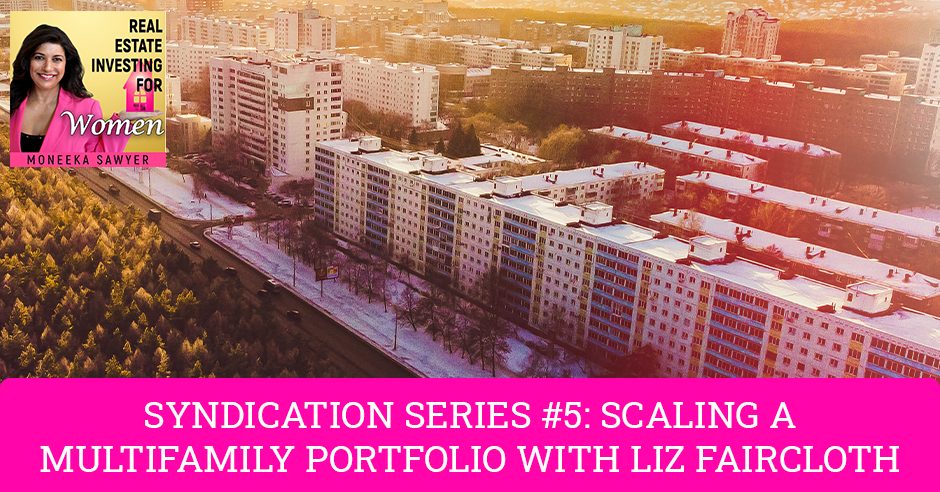
Multifamily is the ultimate goal of many real estate investors in America. Achieving the dream is possible, but how about scaling? That’s where Moneeka will help as she discusses scaling multifamily investments with the cofounder of the DeRosa Group and the Real Estate InvestHER community, Liz Faircloth. Liz talks about getting into real estate, how she and her husband pivoted into multifamily, and what you need to know about out of state investing. Learn more from Liz and Moneeka about the multifamily market by tuning in.
—
Watch the episode here
Listen to the podcast here
Syndication Series #5: Scaling A Multifamily Portfolio With Liz Faircloth
Real Estate Investing for Women
In this episode, I am so excited to welcome to the show, Liz Faircloth. She Cofounded the DeRosa Group in 2005 with her husband, Matt. The DeRosa Group, based in Trenton, New Jersey, is an owner of commercial and residential property with a mission to transform lives through real estate. DeRosa has vast experience in bringing properties to their highest and best value, which includes repositioning single-family homes, multifamily, apartment buildings, mixed-use, retail and office space.
The company controls close to 1,000 units of residential and commercial assets throughout the East Coast. Liz is the Cofounder of The Real Estate InvestHER community, a platform to empower women to live a financially free and balanced life through over 25 Meetups across the US and Canada, an online community and membership that offers accountability and mentorship for women to take their businesses to the next level.
She is the co-host of The Real Estate InvestHER Show, which I will be on too. They published their first book, The Only Woman in the Room: Knowledge and Inspiration From 20 Women Real Estate Investors. Liz has been interviewed for many articles and top-rated podcasts, including mine, including being a two-time guest on the top-rated BiggerPockets Podcast and the Best Ever Show. On the personal side, Liz is an avid runner, has completed several triathlons and marathons, has two adorable children and is a New York Mets fan. Liz, welcome to the show.
Thank you so much for having me.
It’s nice to see you again. You and Andresa do so much cool stuff with the investor community. I love what you’re doing together, but I haven’t gotten to chat with you about what you’re doing. Why don’t you give us a high-level version of your story of how you got interested in real estate and what your path has been?
It wasn’t a linear path. My husband and I at the time had started dating. Before we started dating, I was in graduate school for Social Work. I got my Master’s in Social Work, wanted to open my practice and help people. That’s always been my passion. I grew up in a great family but middle-class family. My dad was a school teacher. I was never introduced to entrepreneurs or investors. That wasn’t in my sphere of any context growing up. Hard work ethic was there, but certainly the business piece of it, I was not familiar with or didn’t have a lot of exposure.
Until I met my brother-in-law, who was an entrepreneur, started a business and handed me Rich Dad Poor Dad. I’m 23 at the time. He’s like, “You got to read this.” I liked personal growth books. I started in college reading different books and always enjoyed them. I liked learning and growing. I’m a dork in college. I’m reading Awaken the Giant Within and everyone’s like, “What are you reading?” I’m like, “I don’t like fiction.” I still don’t like fiction. I have to learn something from it.
Long story short, I read that. My eyes were open to this idea of passive income. I honestly never heard of that before like, “I can have money working for me, not me working for money.” It was a whole new opened my eye concept, which I know a lot of people have said, but what got us involved, I then started dating my now-husband. We lived about two hours from each other. Every weekend we’d go to all the REIA meetings and start learning.
Make sure you’re mitigating risk for yourselves, but most importantly, your investors.
We’re in our twenties and didn’t know anything. We didn’t have any money to invest, but we said, “Let’s just give this a go.” We start taking courses. They told you to like the door knock. This was before Facebook Marketplace. It was literally opening the newspaper, go to the foreign ads and calling tired landlords. That was the million-dollar tip we got at one of the events. That’s what we did.
Every weekend, literally, we are knocking on doors, right outside of Philadelphia, where my husband lived when I visited him. One day, we got someone to say, “That’s interesting. Let me think about that.” We called them back and struck up a deal. A year into us taking courses, door knocking, cold calling and bootstrap whatever we could do, we struck up a deal and bought our first property. It was a duplex for $150,000. We learned everything on that property. We’d go with people.
When you buy a property, the tenants that are there may not be your tenants ongoing because of a new sheriff’s in town. We learned the whole multifamily. It opened our eyes. It was only multis in this neighborhood. It wasn’t like we chose a duplex. It just happened because it was older homes right outside of Philadelphia. There were only duplexes and small multis. Long story short, we got our start there, we moved to New Jersey and started our business. We focused on New Jersey in buying properties there.
We sold that property and did a 1031 into a four-unit and then that started our trajectory in New Jersey. Over many years I’ve been doing this, we had lots of twists and turns. I wished we focused on multi, but we didn’t. We got involved in a lot of different things early on, like people who get distracted as they do and people that are probably a little naive, little young as well, can do. We flipped houses.
We got into tax liens. We bought a commercial building. We bought raw land. Every random thing you could possibly think of, we probably have done it until we doubled down on multifamily. Our business is focused on multifamily. We went from a 2-duplex to a 10-unit. We grew very steadily. We didn’t go from a 2- to a 200-unit. We did, but over time and now we focus on larger multis and we’re starting a fund where we’re investing with other operators and things of that sort.
We’re diversifying a little bit outside of multi but more from a fund perspective. I’m involved in that, not day-to-day but more from like strategic level, helping build our team out and exciting to be able to invest in different sectors of real estate, not just multifamily, but we love multifamily. We have a letter of intent on a property in the Southeast, which is where we focused on.
Tell me a little bit more about this fund. Let’s dive a little deeper into that.
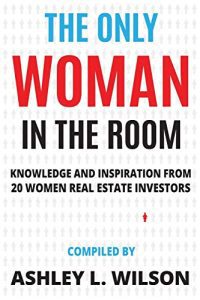
The Only Woman in the Room: Knowledge and Inspiration from 20 Women Real Estate Investors
With regards to the fund, we talk to people all the time. People are like, “This sounds like a great opportunity for a passive investor.” You’re like, “I don’t have a building. I don’t have anything under contract right now.” We refer them. We know a lot of people we like and respect in the business. We have no problem with that. There’s a lot of good syndicators out there.
We wanted to have another flavor of ice cream if you will. The fund will obviously be an ongoing rolling fund and it will give investors what we’re going to invest in and all things that we know and that we’ve vetted. We’re not going to start investing in a business that we have no idea about because that’s a whole other level. It’s like mitigating risk. We want to mitigate your risks. You want to make sure you’re mitigating risk for yourselves, but most importantly, your investors.
Hard money loans will be one. We’re going to start to work with hard money operators that we like and respect, that we know to do good business. We were not the hard money lenders. They are and we’re going to do that. Multifamily will be a piece of it. If we have a project that comes up, we’re going to almost invest in our own projects. That will be a piece of it. Those are the two main pieces.
I want to say, even self-storage, there have been operators. That might be another sector. It will be all related to investing in real estate on some level, but it will be in a way that we are not the sole operators of everything. That’s where, as we evolve, it’s like, you don’t want to do everything yourself. Once you figure that out, you got to focus on that. That’s what that looks like. We’re building out a team and that’s been in the making for some time, but that’s the goal.
I’m so fascinated by that idea because I feel like for me too, there’s something that I do well. I do executive homes in Silicon Valley. I’ve got my entire system. It’s all built out. It runs itself. I don’t worry too much about it. I was telling you before that I’m taking all of May off for my birth month because that’s where my birthday is. We’re traveling to Hawaii and going to a spa in Palm Springs with my sister.
I get to have that lifestyle. It is fantastic. I’m not particularly interested in working significantly more. I do get bored because we have construction projects. We have some other stuff going on so that my entrepreneurial mind doesn’t slow down or get bored. What is happening is I’ve found several different syndicators doing different things. I’ve invested in storage, multifamily and a variety of different things like what you were talking about.
I don’t know how this is going to work for you guys, but every single time I invest, it’s a minimum of $100,000. That’s great for us because we have that money. We’re looking to retire. We’re moving that way, but not everybody who’s reading to this show has access to $100,000 for this and that. They want to be able to diversify without spending that much money. What is that fund look like for you? Is there going to be a minimum investment? Have you worked that out? What does that look like?
One organization we’ve started working with is called Republic. Basically, what they do is, in essence, have a similar type of approach in that people could invest $10,000, even down to $1,000. Don’t quote me on that but I’m not familiar. What’s fascinating though if that for our last syndication, it was a 336-unit apartment building. To your point, our minimum was $50,000 on that project. Not everyone has that, but they want to invest in real estate.
Don’t do everything yourself. Do what you do and do it well.
We found this company and what basically they’re doing is they’re the investor in that project, but they’re the ones going out to the accredited investors because it was the accredited investors to then say, “We are all pooling all this money to gather,” then they are the investor in that project with us. Just so Jane Doe, who’s got a $1,000, they’re all pooled in this together in this company called Republic. Republic is ultimately the investor, if that makes sense. It was really cool because that was the first time we’d ever done that because we thought about it. We have a 336-unit apartment complex. We had close to 80 investors. It’s a lot of people and that’s even at a minimum of $50,000.
You had some people who put a $500,000 and some people put any amount. There’s a lot of money assigned. I’m the cheapest person. I would be putting $1,000 at anything. I’m like, “That’s me. I’m in that kind of money.” I know. I get it. That was interesting. We were pleased to see that. It’s a neat approach. That’s the future, to be honest, because I love that concept and I was intrigued by it. As we do other deals, we’re going to be working with them. I’m not sure the relationship exactly and how that’s going to play out in the fund, but those are the neat example for our last syndication that gave everyone the opportunity and that’s cool.
Are they more of crowd funders, syndicators or do you have any idea of their structure? I’m interested.
I’m not too sure which level they are. I heard about it conceptually and was intrigued, but I know that they’ve been around and they’re not just at the start of the company. There are a lot of different pieces around it to ensure how you do it because some funds are accredited and not accredited. There is an of legal stuff and a lot of money to the SEC attorneys and all that kind of stuff.
I know this is a project we advertised because we only accepted accredited. It’s a project that you can’t solicit. It’s illegal to do that. We have these other projects from friends and family, but I know with this particular project, we advertise because we only accepted accredited. It’s a neat approach, but I’m happy to get more info.
Let’s put our heads together. I’d love to know a little bit more about that because I’m always looking for ways. When I get phone calls from my ladies, when they say, “I’ve only got this much, what can we do to that, for that and with that to benefit them in the biggest way?” Another topic that I’m getting a lot for my ladies is this idea of out-of-state investing, especially here in California. There are a lot of markets where people feel like, “I can’t invest in my backyard.” They’re scared to go out of state. I know that you do a lot of multifamily out of state. Let’s talk a little bit about that, share your perspective and how to look for projects and stuff like that.
For our first seven years, we invested locally. We don’t invest more than 30 minutes away. We had a team. We had a leasing agent. We had our bookkeeper who did all the accounting. We have a tenant relations person and a maintenance person. We had literally four people on our staff besides my husband and me, helping us manage our local properties. We bought a property in Philadelphia, which was an 18-unit and now it was 35 units. It’s like, “We can still do it.” The market shifted. I’m in the Northeast and New Jersey is not the most favorable state on taxes in this country. Even in Philadelphia, the projects that we were looking at were getting outbid.

Scaling Multifamily: We’re not going to start investing in a business that we have no idea, because that’s a whole another level.
It was getting more expensive and we raised money. We work with investors. The returns are important to ensure that we’re going to get into the right project. We’re not just parking millions of dollars from a relative. we’re constantly looking at, “How are we going to get into the right area for our investment goals and our investors?” A broker had brought the same broker. That’s the first thing I’d say as a good tip is to start building relationships with commercial brokers.
Sometimes it’s tough, especially now. You think about a hot market. Everyone’s calling commercial brokers saying, “I invest in multifamily. Do you have anything for me? You and 90 million other people.” You got to like differentiate. Keep that in mind too. We had closed that eighteen-unit with the same broker who called us about a property in Lancaster, Pennsylvania, which is about an hour and a half from where we were living at the time.
He said, “Are you interested?” We like, “One hour and a half, we’re not going to send our leasing agent there. We’re not sending our maintenance person there. We need to look into property management companies.” After betting the deal and that’s a great story in and of itself. The first domino always is a good property management company. You’re going to need that. Some people successfully invest in properties and they self-manage the properties. I’ve heard of it. I know a lot of women who do it successfully.
We knew at a 49-unit, it wasn’t going to be our best strategy. We knew it was going to be important to have a local property management company. Why I say that’s a great person to have on your team? Let’s say your sourcing an area in Alabama or wherever you’re sourcing deals. Before even looking for property, start getting to know the property management companies there because that’s going to follow.
If you cannot find a property management company in a geographical area, that might be a sign for a lot of reasons that something is off. Even with Airbnb, I know that’s very hot vacation rentals and luxury vacation rentals or whatever the people are interested in. If it’s a hot area, there are people managing in that hot area. That’s a great source and a great team member to start to talk to. Number one, they know the area, what streets are good or aren’t good? What areas are up and coming? What areas are just too hot and too expensive because we know that’s the case.
In it exuberant, everywhere is like, “Hold on. What do you want?” On my way to Target, at the end of the day, you’re a real estate investor. You never turn it off. I saw a lot for sale. I’m tangent. I saw a sign that said For Sale and a handwritten phone number. I’m like, “That’s a good sign.” It’s a great area and what county where I live. I’m like, “That’s an interesting area.” I texted the person. I said, “How much is the lot? What’s the size?” All the things you ask. “We’ve done a bit of new construction a time, but we could probably pull it off $250,000.” I’m like, “I don’t even know if you’d get $500,000 for the property. That’s just for the lot.”
People are not even with their prices. Going back to out of state, property management companies are helpful to have on your team. What commercial brokers care about is if you’ve closed deals. They do not want to work with people who are going to get to the finish line and not be able to pull the money together because they want their commission. That’s what they care about.
Beyond everything else you want to talk about with them, they care about if you’ve closed with them or with anyone of them. If you or someone on your core team has closed deals that you’re looking for. If you’re looking at 100-unit, you better have someone that you’re bringing to the table that, “This is the kind of team we have and we’ve done. This is what we’ve closed.”
The idea of the diversity of jobs is even more important than job growth.
That is what they’re thinking right now when you call them. This broker brought us this project and we started to talk to property management companies in the area. What helped and I’d always say this, is if you have somebody in your family or network who lives in the area, it is helpful. You don’t need to have a degree in real estate. They don’t have to have ten years of investing.
If you have some boots on the ground and feet on the street, people that aren’t just property management because our property management company is a vendor, we always like to offer our property management companies potential ownership in the building. Every time we buy a building and we say, “We’re syndicating this. Would you like to own part of it as well?”
It’s not the best sign if they’re like, “No.” Even if they put $25,000 and maybe they think that’s chump change. Most of all the property management companies we’ve worked with have invested in our deals. That’s a good sign. That’s skin in the game, so to speak. I would say the second, start to look at, “Is this an up-and-coming area? Do I know anyone in my network that can help me? Is there a reason to go there? Do I want to go there?” If you’re going to invest in an area that those are questions to ask. If I have to now get on a plane, is that on the way to my aunt or my parents? Is this an area where my kid’s going to college for the next four years?
I don’t know, but make it make sense versus an area that literally you know no one. That can work, but if you can blend a few things in there and it is an up-and-coming area, you’re going to want somebody that’s 10 to 15 minutes from the property, whether it’s a realtor, you got to pay them hourly. If you can’t get there, someone needs to get there because fires happen. Things happen. We have a cousin in this area, Lancaster.
When we’re looking at it, we’re like, “What do you think?” He’s an investor, which was even better, but he was able to be our boots on the ground. He’s part of our general partner. It has been huge. We had a fire there years ago. We want to be to make sure everyone’s okay. We couldn’t be in one hour and a half. The fire is probably going to throw a little more damage than ten minutes.
You said so much there, but a couple of things that I want to highlight is I think that people think that you hear about an amazing market and you should just invest in there. I remember before 2008, in the mid-2000s, everybody was in Henderson, Nevada, outside Las Vegas. I have close friends who are all invested. There was also Florida and Chicago.
Those were some big hubs where they were marketing to investors from out of state, especially California, because California had a bunch of equity and wasn’t working for us. Everybody could get loans by just stating things, so there were these pockets that were trending. People were making money hand over fist.

Scaling Multifamily: You’re going to need a good property management company if you’re investing out of state.
I thought I always play the longer trend. I don’t play the short short-term trends. I will admit I would probably be a lot richer if I got that right more often, but there are so many people that get that wrong. Part of it is they didn’t do some of the things that you talk about. It wasn’t a place that I would ever want to visit. It wasn’t a place on the way to anything Las Vegas, Chicago or Florida. A lot of people didn’t have that mentality of, “Would I want to go there? Would I vacation there? Would I want to live there? Would I want my kids to go to college there? Is there any reason for me to go there?”
Even in Henderson, it’s not like people were like, “I’d like to have something in Henderson because I like to go to Las Vegas.” It was, “I’m investing in Henderson because everybody else is investing in Henderson.” I love how you talk about this, especially in your first few deals. This is hugely important is as you’re getting to know what this is like, the very first time you step out of state, you don’t want it to be in a market that you completely don’t understand that you get a bunch of numbers from someone that’s a vendor. They’re interested in selling these properties.
They’re not going to lie to you, but they’re definitely going to paint a very pretty picture. If you don’t know the market and you don’t know anybody who’s there. We had a friend that moved to Henderson and we went to visit them one time when we went on a trip to Las Vegas. He was like, “There are all these crazy investors coming in here.” All around town, people are like, “This bubble’s going to blow,” because there weren’t as many people in the restaurants anymore and there were things that were closing down.
We’re like, “How is it possible that all his expansion is happening, but the Asheville economy is shrinking?” There’s no way to have known that if we hadn’t had this conversation with our friends that had just moved there. There’s all this hype about Henderson, but they just closed down the local, Whole Foods or whatever market it was. I love what you talk about as we don’t have to have boots on the ground all the time, every time. Eventually, you do develop a skill and get to know markets or you focus on certain markets.
Especially in those first few deals that you’re going out. That is all such good advice. Make sure that it’s someplace you would want to go. It’s like basic, intuitive, common sense stuff that we don’t think about because we get whisked away in the excitement of what’s possible. That basic comments and stuff, I like to go there. Is there anything there that I appreciate? Do I have someone that’s relatively close by maybe within a half-hour that they’re not going to be boots on the ground? Just have the conversation once in a while, see how things are going in that market or whatever.
Thank you so much for that because normally, people are like, “You need to look at the colleges, employers or the average income rate.” You do need to do all those things, but it’s not the end of the story. Especially when you’re starting, it’s not necessarily going to give you the comfort that you need to get out there and do it because nothing happens for you until you take action. If it’s just the numbers and that’s not inspiring you to take action, then nothing is happening for you.
Many people do get caught up. There are so many important numbers as you analyze markets and deals, but even just the idea of what COVID brought is the importance of diversity of jobs. Are there different jobs that people can be employed by? They’re literally all in on the tech, government or in whatever industry. The idea of the diversity of jobs is, to me, even more important than job growth.
They’re both important, but just to know that people can get different jobs. These are positive things. There are many markets that don’t have that. Even high-priced areas don’t have that. We probably invest more in the workforce housing, more up-and-coming areas, not areas that are on any hot market list. If those are the two expensive areas, we’re like, “No. We don’t want to invest in an area that’s on any list.”
Your mistakes are going to just make you propel you forward and you’re going to learn from it and you’re going to grow from it.
It’s much more practical advice. My ladies learn a lot of good advice here from very smart people because sometimes we got to ground it. This is how you make yourself comfortable with that. Ask yourself some real common sense questions because so much of building a real business is common sense. There’s a lot of fancy languaging. There’s a lot of people that say things that sound smart, but in the end, it’s a common-sense business. Thank you so much for grounding that for us. That was helpful.
Ladies, we are going to do EXTRA. Liz and I are going to be talking more about building your team. Finding partners, building teams, when you’re in-state or out of state. She likes to say, “Who’s on the bus,” and then team-building with all those people that are on the bus. I love that picture because you’re all going out on a field trip and you’re all on this bus. Where are you going to go? How are you going to get there? Is it going to be fun? Is it going to be profitable? That to look forward to. Before we move to our three rapid-fire questions, could you tell everybody how they can get in touch with you?
In terms of some of the active multifamily projects or funds or to learn more about some of the day-to-day real estate projects, you can go over to my DeRosaGroup.com. My husband got a lot of teaching as well. We’re both love teaching and helping. You’ll see a lot of YouTube content and things of that sort from him. In terms of women who are interested in getting more support from women and getting connected, check us out, TheRealEstateInvestHer.com. From there, you can learn all about our meetups that are across the country and our Facebook Community, membership and things we got going on with helping women.
Are you ready for three Rapid-fire questions?
Yes, definitely.
What’s one super tip on getting started investing in real estate?
Don’t get distracted. Focus on a niche and go all-in on one thing.
What’s one strategy to be successful as a real estate investor?

Scaling Multifamily: Everyone gets stopped after they lose money and something bad happens, but don’t give up.
Don’t give up. I hope you don’t lose money, but you may lose money, like many of us. You’re going to see it potentially. In many years, I can tell you a lot of interesting stories. It had money like the mini Bernie Madoff situation where literally hundreds of thousands of dollars were stolen from us. We don’t give up. That makes anyone that’s successful in any line of business or anything in life, don’t give up. Know that your mistakes are going to make you propel you forward. You’re going to learn and grow from it. If you don’t have that attitude, then everyone gets stopped after they lose money and something bad happens. Don’t give up. That’s the key.
What would you say is one daily practice that you do that contributes to your personal success?
It’s something I’ve always done, then go back and forth and don’t do it consistently. I do daily prayer. I read a little spiritual and think about it. I’ve been doing like ten-minute meditation. I’d like to increase that eventually. For me, it’s been super helpful. I focus on whatever I learned in that prayer. I focus on that in my meditation. If I miss a day, it’s rare, but I have maybe missed 1 or 2 days for four months. Every day, I get that in.
My meditation practice has gently worked its way into my life, to where I don’t even think about it. It started just to happen, then I missed three days. My husband and I were on edge. I lost my temper at a restaurant. I didn’t yell at anybody, but I didn’t have the patience to wait. Nobody saw it, but I felt it. I’m like, “What is going on with me? Who is this person?” My husband was like, “Are you stressed out?” I was like, “I haven’t been meditating. I haven’t been taking Moneeka time.” I have been taking Moneeka time. I got a pedicure. I still do, but that piece that starts my day has been so important. I’m glad you mentioned that.
It’s constant. It’s like going to the gym. You can’t do it once and you’re good.
I always say about bliss, like all of our bliss practices. You can’t just brush your teeth once in your lifetime and hope your teeth are going to be good. You got to brush it every day. You got to keep doing those little things. Liz, as always, I’ve loved our conversation. Thank you for everything you shared in the show.
Thank you so much for having me. This is amazing. I hope I was helpful and gave some content that your audience will help them with.
Liz and I have more to talk about. We’re going to be talking about building teams, who are on the bus, and all of that good stuff. Stay tuned for EXTRA. If you’re not subscribed, go to RealEstateInvestingForWomenEXTRA.com. You get the first seven days for free. Check it out, see if you love it, and if you don’t, that’s totally fine. For those of you that are leaving Liz and I, thank you so much for joining us for this portion of the show. I look forward to seeing you next time. Until then, remember, goals without action are just dreams. Get out there, take action and create the life your heart deeply desires. I’ll see you soon. Bye.
Important Links
- DeRosa Group
- The Real Estate InvestHER
- The Real Estate InvestHER Show
- The Only Woman in the Room: Knowledge and Inspiration From 20 Women Real Estate Investors
- BiggerPockets Podcast
- Best Ever Show
- Rich Dad Poor Dad
- Awaken the Giant Within
- Facebook Community – The Real Estate Investher
- RealEstateInvestingForWomenEXTRA.com
About Liz Faircloth
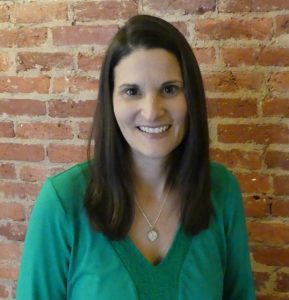 Liz Faircloth co-founded the DeRosa Group in 2005 with her husband, Matt. The DeRosa Group, based in Trenton, NJ, is an owner of commercial and residential property with a mission to “transform lives through real estate.” Liz is the co-founder of The Real Estate InvestHER® community, a platform to empower women to live a financially free and balanced life on their own terms through over 40 Meetups across the US and Canada and an on-line community and membership that offers accountability and mentorship for women to take their business to the next level!
Liz Faircloth co-founded the DeRosa Group in 2005 with her husband, Matt. The DeRosa Group, based in Trenton, NJ, is an owner of commercial and residential property with a mission to “transform lives through real estate.” Liz is the co-founder of The Real Estate InvestHER® community, a platform to empower women to live a financially free and balanced life on their own terms through over 40 Meetups across the US and Canada and an on-line community and membership that offers accountability and mentorship for women to take their business to the next level!
Love the show? Subscribe, rate, review, and share!
______________________________________
To listen to the EXTRA portion of this show go to RealEstateInvestingForWomenExtra.com
To see this program in video:
Search on Roku for Real Estate Investing 4 Women or go to this link: https://blissfulinvestor.com/biroku
On YouTube go to Real Estate Investing for Women
Moneeka Sawyer is often described as one of the most blissful people you will ever meet. She has been investing in Real Estate for over 20 years, so has been through all the different cycles of the market. Still, she has turned $10,000 into over $5,000,000, working only 5-10 hours per MONTH with very little stress.
While building her multi-million dollar business, she has traveled to over 55 countries, dances every single day, supports causes that are important to her, and spends lots of time with her husband of over 20 years.
She is the international best-selling author of the multiple award-winning books “Choose Bliss: The Power and Practice of Joy and Contentment” and “Real Estate Investing for Women: Expert Conversations to Increase Wealth and Happiness the Blissful Way.”
Moneeka has been featured on stages including Carnegie Hall and Nasdaq, radio, podcasts such as Achieve Your Goals with Hal Elrod, and TV stations including ABC, CBS, FOX, and the CW, impacting over 150 million people.
Syndication Series #3: Fundamentals Of Investing To Achieve Financial Independence With Chris Larsen
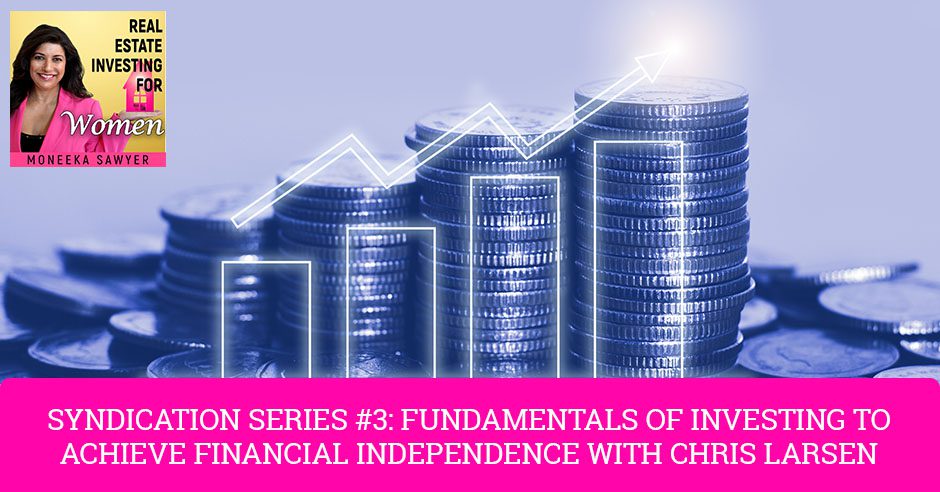
Real estate is the best path towards achieving financial independence. Becoming financially independent means having the choice to do what you want with your time. In this episode, Moneeka Sawyer sits down for some great insights into real estate with investor, author and entrepreneur, Chris Larsen of Next Level Income. We hear Chris narrate what got him into real estate, starting from single family to commercial real estate. Chris also shares his investing strategy and how Infinite Banking works, and how to leverage your insurance policy for cashflow. Drop by and listen in as Chris and Moneeka share valuable information for investors to use.
—
Watch the episode here
Listen to the podcast here
Syndication Series #3: Fundamentals Of Investing To Achieve Financial Independence With Chris Larsen
Real Estate Investing For Women
In this episode, I am so excited to welcome to the show, Chris Larsen. He is the Founder and Managing Partner of Next-Level Income. Chris has been investing and managing real estate for several years. While still a college student, he bought his first rental property at the age of 21. I love people that get into this industry young.
From there, he expanded into development, private lending, buying distressed debt, as well as commercial offices and ultimately syndicating multifamily properties. He began syndicating deals in 2016 and has been actively involved in over $225 million of real estate acquisitions. He is passionate about helping investors become financially independent. Chris, welcome to the show.
Thank you so much for having me. I’m excited to be here.
I’ve been looking forward to this show and you’ve been so patient with me with all the rescheduling. Thank you. I’m glad we’re finally here. Chris, give us a high level of your story. I know it’s very exciting.
First off, I love that you bring up to get started early. Now it’s early, whenever you can do it. I was 21 when I was in college. My passion at the time was racing bicycles. I went to Virginia Tech for Biomechanical Engineering. I did pretty well in school and I was told like, “You should be an engineer like your grandfather.” All I want to do is race bicycles.
Cycling is like a real engineer sport because it’s all about numbers and power to weight ratios. At that time, drug which I wasn’t into. That was the end of my story in a lot of ways because I didn’t want to do that. Along the way, at that same time, when I was at this turning point, trying to decide what to do as I was looking towards a professional career, my best friend, roommate and training partner passed away. He had a massive brain hemorrhage between my freshmen and sophomore year in college.
I poured another year into the sport and then I realized even after I was winning more and more races, that I wasn’t happy. Even though my team went professional, I didn’t. I stepped away from the sport, went back to school. As a junior in college, I thought like, “What the heck am I going to do with my life? I don’t want to be an engineer. I was going to go race and then figure out what I wanted to do.” While I was racing and even when I was young, the first thing I remember and probably if you’re reading, you think the same thing. You hop on your bike and you have this tremendous sense of freedom. That’s what I wanted.
I wanted the freedom to live life on my own terms to respect not only the life I was giving them but also the life of the friend that I lost. I turned towards investing. I was introduced to it by the same gentleman, Clint Provenza, who introduced me to cycling. My father passed away at five and he was a real mentor to me. I started looking into investing. I was day trading, and one of those nights/mornings that 3:00 AM, when I was laying there in bed, thinking about what I should do with my trades. I thought like, “Do I want to be doing this twenty years from now?” The answer was no.
I looked at other investments. I read over 250 books on money, investing and settled on real estate because you could control it. I bought my first property at 21. I built and managed a portfolio of single-family rentals for fifteen years but ultimately transitioned into commercial real estate. That’s what we focus on. I try to enlighten people and share my mistakes, so they can take the fast track to get towards financial independence, which took me a couple of years.
It’s so interesting. I have a very similar story in that. I wanted to be a dancer and that was my thing. I came to investing for a similar reason. I wanted a life of choice. I think that freedom of choice is our true wealth. That’s what I wanted and real estate allowed that. It did take me several years before I could say I could retire, my husband and I, but I couldn’t do with the lifestyle that I wanted in California. We would have had to move, so we continued to grow our portfolio, but it was the same thing. After several years, we are doing everything now that we’re doing because of the choice and we want to do that. There’s nothing more liberating than that.
At some point, income is important, but it’s the freedom to choose that brings happiness.
I think studies show. I teach a financial literacy course here. It’s high school students coming out of underprivileged homes. Most of them are living below the poverty line. We had a conversation about, at some point, income is important, but it’s the freedom to choose. I cited the study that shows the janitors that have freedom in their day-to-day choices are happier than the CEOs that are making 10,000 times now what they are, but they’re not happy because they don’t have freedom.
My TED Talk is about this and there’s a lot of research about there’s a threshold where money does buy happiness to a certain threshold. The original number they came up with within 2010 was $75,000, but a study was done in January 2021 that said it was $100,000. It’s gone up because of inflation. Whatever that number is, it’s $100,000 now.
Up until then, the number of dollars that you bring into your household does relate directly to the level of happiness in the household or the level of satisfaction. After that, now we have freedom and excess income. We are taken care of and now we can focus on joy, bliss. I’m so glad we’re on the same wavelength around that. Tell me about this concept of infinite banking.
Next-Level Income was born of this desire to curate information around financial literacy and education. As I built it out, we have three main areas. We talk about how to make, keep and grow your money. Those are the three steps. I have coaching clients and that’s what we work through like, “How can you maximize how much money you’re making? How can you keep more money?”

Financial Independence: Freedom of choice is our true wealth. Real estate allows that.
Thank you so much. Talk to me about your perspective on multifamily. This is a hot topic with my ladies.
I call multifamily real estate the holy grail of investing. If you look at my book, it says How to Make, Keep, and Grow Your Money Using the ‘Holy Grail of Real Estate’ to Achieve Financial Independence. I’ll send you a copy for free if you go to the website. I’m so high on multifamily. I was the person that managed my portfolio for fifteen years.
I was the person that got the phone call on my honeymoon in Costa Rica and paid $40 and collect call fees to deal with a problem tenant. I was the guy that stayed in too long and didn’t get a great return on my properties. I was also the guy that was fortunate enough to run into somebody that introduced me to this space. I started to investigate multifamily real estate and I’m a demographics guy. I spent eighteen years in the medical device industry. That’s how I made the money to invest. I got into a medical device.
I moved and lived in Asheville, North Carolina, because we have great demographic trends. When I started to investigate multifamily being an engineer, day-to-day guy and analytical, I found that multifamily was supported by these terrific demographics by what we now call the Millennials. They rented and guess who’s supporting multifamily now? It’s their parents, the Baby Boomers. They’re selling their homes and renting and now Gen Z is renting as well. We’ve turned into this nation that we like to own the American dream, but also flexibility.
I jumped into multifamily because of the demographics and the analytics. My MBA is in Portfolio Managementhat I found is something that Ray Dalio calls The Holy Grail of Investing, which allows you to increase the Sharpe ratio. The Sharpe ratio increases the returns of your portfolio and decreases the risk. It’s like a boat that goes faster and it has less bumps when you’re on it. I thought, “What is better than that?” Ray Dalio calls that The Holy Grail of Investing. I call multifamily the Holy Grail of Real Estate because it allows you to increase the returns in your portfolio and allows you to decrease the risk.
I know that in EXTRA, we’re going to talk a lot more about multifamily. We’re going to go deeper to the pros and cons of multifamily and then he’s going to do some number breakdowns for us. These are things that I get asked about a lot. It’s not my strong suit. My husband and I have not been involved yet in multifamily. The commercial evaluation of the numbers is not his strong suit, so he hasn’t had to do it yet. This will be fun. EXTRA will be talking a lot about that stuff, but why don’t you give us a high level on why you like multifamily? What’s so exciting about it?
There are a few things. If you’re reading and you’re like, “I love real estate, but I don’t want to be the person that has to go in and fix toilets, find new tenants, screen people and do showings and all that.” I get that because I’ve done it. The big thing is if you invest in multifamily with an experienced operator, it’s 100% passive. You can invest, be a direct owner, get the income, the depreciation and the depreciation of great tax benefits, especially if you’re a high-income earner, but you don’t have to deal with it all yourself. That’s fantastic. It’s scalable.
You could buy a 100 unit multifamily building for $10 million. You could buy a $1 billion multifamily portfolio. Whether you’re investing in your first deal or you’ve been investing for twenty years and you’re looking to place $1 million or $10 million of capital, you can use the same strategy. It’s very scalable. There’s something that I like even more, it’s the control. You might’ve heard me talk about laying in bed at 3:00 AM feeling like things were out of control with my money. I like real estate because you can control it.
We’re acquiring a property in Greenville, South Carolina and we live in Asheville, which is about an hour away. We were down in South Carolina for my son’s 9/11 lacrosse game. I took him to the property and we drove around. It was built in 1997. It’s a little beat up. The stairs needed to be replaced. They need new paint. We can control all of those things. If you own a business, apartments are valued like a business. They’re valued by net operating income. If you live in your home or you have a rental home and it’s 1,000 square feet, and it sells for $300 a square foot, it’s worth $300,000. It’s easy math.

Financial Independence: Next Level Income was born of this desire to curate information around financial literacy and education.
The bank figures that out because they say, “The home on your right is worth $305 a square foot, on your left is worth $295 a square foot.” Yours is about $300 a square foot. You don’t control that. The market goes up and down. If we go and buy an apartment building for $10 million and it has $1 million of net operating income, that’s probably not a great metric. Call it a $20 million apartment building with $1 million in net operating income.
We increase the net operating income 50% from $1 million with a $20 million to $1.5 million new valuation. You’re probably thinking to yourself when your cap rate is $30 million. We control that when we’re able to move the rents by the renovations, operations, being more efficient, bringing better management and those sorts of things. Again, it’s passive and scalable, but most importantly, it’s controllable.
I’m sure some of you are like me going, “Wow,” but we will break this down so you can go through this again and we’ll break down more of that in EXTRA so we can take it a little bit slower. I feel like you already covered this. What are the important metrics? What exactly should we be looking at?
I’ll dive a little deeper again. We can unpack this a lot more in the EXTRA section. I started as an investor in these deals. I was called a limited partner before I syndicated these deals and became a general partner. If you’re a limited partner and you say, “I’m interested in this.” You need to look at three different things. You need to look at geography. Are you investing in an area of the country that people want to move to? I wrote a whole blog post about this. I talked about how you can identify these. It’s very easy to see with reports from companies like United Van Lines. You can go on our blog at the beginning of 2021 and read the post I put on there.
You want to be in large cities where people are moving, that is growing faster than the national average. Where are these cities? A lot of these are from the Southeast. I moved to North Carolina for the demographics, the Carolinas, Florida, Georgia, Texas, Phoenix, Colorado and Boise, Idaho seems to be a big one here. Why are people moving here? They’re moving out of California to places like Colorado, Texas and Idaho.
They’re moving to the Southeast from places like California, LA, New England and New York. The places that are cold and don’t have a great quality of life. Taxes are going up. I have a coaching client. He told me and he’s like, “We’re looking at South Carolina to move. Taxes are going up. We don’t want to live here anymore.” Number two, the operator. Are you working with an operator? This is somebody that’s going, finding and buying the property. That’s going to bring you in alongside them and then they’re going to operate it. They’re going to increase that net operating income.
Have they done it before? Have you done it in the geography that you’re invested in? What is their experience there? You want to ask him some tough questions about what’s their strategy. You look at the metrics in the deal. That’s pretty complex. We looked at over two dozen different metrics on the deals that we’re in, and there are a lot of different variables that come into play. Again, if you’ve ever invested in a business, if you’re a business owner or professional, you can read a financial statement.
That’s the thing. If you call me and say, “I’m interested in this deal.” As an owner of this property, you’re entitled to all the same information that you would be entitled to if you own a single-family home. You can go through those and you can call the operator and say, “Walk me through this. What am I seeing here and there?” Don’t be afraid to ask those questions and understand the numbers, strategy and why an operator is going into the market.
Talk to me a little bit about ROI. Different operators do this differently. Tell us a little bit about how you structure your deals for your investors.
What we do is called syndication. Syndication is very simple, it is someone, an operator going out and bringing in investors alongside them to invest. What’s important is how that syndication is structured. What we do is we do what’s called a preferred return. If you look at deals, say 6% to 8%, what does that mean? That means investors get the first 6%to 8% of the returns coming from that property. Investors are preferred in front of anybody else. They’re going to be subordinate to the lender.
The other thing that’s nice about these properties is it’s called non-recourse debt. I work with a lot of doctors after spending several years in the medical device profession. They don’t want more risk, more debt and a bank to come after them for something. They have patients that are out for them if something bad happens. That’s a nice thing about these properties as well.
After taxes, the next biggest expense that a lot of people don’t think about is financing.
After the lender, the investors get that preferred return. There’s an equity split. That split is a large part that goes to investors and then the partners that organize these deals get the minority position in there, but that’s the incentive. You want to work with the group, in my opinion. How we do it is we give the investors the first big portion of the returns, about a half of the returns upfront. The other half comes from that split on the backside and then we as partners get a piece of that split.
We’re incentivized to maximize the profit of that property on the backend. You asked a question there and I’ll address this. There are a couple of different ways to look at this. You can look at a total return. You’re going to get a 10% return comprised of half cash and half appreciation on a property. There’s also an equity multiple. You’re going to double your money over a certain period of time, it’s another way to look at it. There’s also what’s called the IRR, the Internal Rate of Return.
We can dive deeper into the EXTRA portion of the show or you can go ahead and check out my book, which goes deeper into this as well. You can always read on a site like Investopedia, which dives deeper too. It depends on what type of investor you are. Maybe cash or the total return is important to you. It all depends on what type of investor you are.
Do you pay investors immediately? When they first invest money, are they guaranteed a certain return each year while the project is happening? How do you structure that for your people?
One little red flag is we never say guaranteed because these are investments that have a risk associated with them. If you ever hear me say guaranteed, you should either slap me on the face with a stick and a paper towel or something in my mouth too. We have a couple of different types of investments. We have investments that we pay investors a fixed return based upon the performance of the property. Our group pays out monthly. We like to pay out monthly. There are groups that payout quarterly. It’s not necessarily better or worse, but personally, I like to get money in my account every month.
You then get some stuff on the backend depending on how the project goes.
In multifamily syndication, you’re going to get regular cashflow monthly, quarterly or annually. When the property sells, think about it like a rental property. You’re getting rent. If you’re renting it out for $1,000 a month and your expenses are $900, you might get $100 a month. When you sell it, if you bought a property for $100,000 and you sell it for $150,000, you get that $50,000 profit on the backend. It’s very similar to that.
Do you guys do the whole refinance structure piece too or do you go for the sale?
When we model out the returns on a property which is called the pro forma, we don’t assume we’re going to refinance the property. If you’ve ever owned a rental property or you have a property of your own, what’s nice is if you have a HELOC, a Home Equity Line Of Credit and you pull money out of your home or an investment property, you don’t pay taxes on that when you pull that money out.
You might pay taxes when you sell it, but you don’t pay taxes when you pull it out. It’s very similar to what we do. A lot of times, we look to do that if the property is performing. We don’t tell investors that’s part of the plan because we want to be a little bit more conservative than that but that is a very optimal way to pull an investor capital out in a tax-efficient manner.
While we dove pretty deep into all of that stuff and I know we’re going to get even deeper, so definitely stay tuned for EXTRA. We’ll be talking more about the fundamentals of multifamily investing and the numbers around that and also the why or why not to do it.
Before we move into our three rapid fire questions, I want to let you ladies know how you can get in touch with Chris because he’s amazing, isn’t he? He’s got two awesome offers for you today. First of all, he’s going to give you his book for free and he and I are holding a webinar together so that you can meet him live and ask as many questions as you’d like.
Learn how you can invest like the rich to create true freedom for yourself by getting a free copy of his book nextlevelincome.com/bliss, where he’ll send you a copy of his book for free.
Also join Chris and me for a free webinar designed just for you to get informed and ask questions about how Chris does syndication and how he can help you to save the date. December 2nd, at 4:00 PM Pacific time. Go to blissfulinvestor.com/syndicationwebinar. That’s blissfulinvestor.com/syndicationwebinar.

Financial Independence: Syndication is very simple. It’s an operator going out and bringing in investors alongside them to invest.
I didn’t tell you this, Chris, but we have three rapid-fire questions. Are you ready?
I love it. I’m ready. I told you I’m wide open here, so let’s do it.
Tell us one super tip on getting started investing in real estate.
The best tip I can think of is to find somebody that has gone down the path you want to go down and either ask them for advice or hire them to help be a mentor.
What would you say is a strategy to be successful in real estate investing?
I think success, in general, is habits. Whether you want to be successful in real estate, successful in life, losing weight or whatever it may be, you need to focus on your daily habits. If you want to be successful in real estate, that may be in as far as syndications or passive investments or reviewing a deal every day or every week. If you are going out and buying your own properties, that may be contacting brokers, making phone calls and getting options out there that are coming in towards you on a regular basis.
What would you say is one daily practice that you do that contributes to your personal success?
I’ve learned a lot over the past years. I bought my older son The Five Minute Journal for Kids. It is basically a gratitude practice. I know you’re big on this. I think happiness comes before success. You have to get in that right mindset, the abundance mindset, which is what you share. You know that success and that money will come to you and there’s always a deal out there. You don’t have to worry and fight over these things. Share, help other people and other people will help you get in the right mindset. That’s what I try to do every day.
This has been an amazing show. Thank you so much for all you’ve already contributed, Chris. This has been great.
It’s my pleasure. Thank you so much for having me.
Before we close out the show, I want to head off any confusion we might have about upcoming webinars. So in order to make this series the most valuable possible for you, I have arranged to have two webinars during the next couple of weeks.
The first one is going to be with Dr. Sam, who you heard from a couple of weeks ago. He is an investor just like you ladies. And he has figured out how to evaluate syndication opportunities that come across because he gets a lot of them. And if you’re interested in them and you put your name out there, you will start to get a lot of them. You’ll learn how he evaluates them so he can figure out which projects are the best for him regarding his risk tolerance, his capital availability, and what kinds of projects he’s actually interested in, like location and that sort of thing.
Dr. Sam has developed a tool he’s now sharing. So we’re going to do a webinar with him and you can talk to him about what it’s like to be an investor in syndications and what to expect. And then also he’s going to go through his tool specifically and show you how he’s evaluating different projects. So I’m really excited about this because you actually get to have a conversation LIVE with another investor who’s actually doing investing in syndication projects. So in order to sign up for that webinar, go to blissfulinvestor.com/Samwebinar. So that’s for Dr. Sam, right? So blissfulinvestor.com/Samwebinar. And that webinar is going to be held this week on Thursday, November 18th at 5:00 PM Pacific time. So again, that’s Thursday, November 18 at 5pm pacific time. Go to blissfulinvestor.com/Samwebinar.
The second webinar we’re doing for the syndication series is with Chris, who we just heard from in this episode. As you know, he’s an operator. So he’s going to be able to answer questions about how syndications actually work, how they’re put together and all the details of what you can expect from an operator. So that’s really exciting because you can ask as many questions as you want from an actual operator LIVE. So that’ll give you more confidence what you need to know with regards to how syndications are run. So I’m super excited about this one too. And this one is on Thursday, December 2nd, at 4:00 PM Pacific time. So that’s Thursday, December 2nd at 4:00 PM Pacific time. And to sign up for this one, go to blissfulinvestor.com/syndicationwebinar. So that’s blissfulinvestor.com/syndicationwebinar.
So to give you a really quick recap, Dr. Sam, who is an investor and is going to be sharing his evaluation tool, we’ll be holding a webinar this week on Thursday, November 18th at 5:00 PM Pacific time . Go to blissfulinvestor.com/Samwebinar.
And then Chris Larson will be holding a webinar as an operator on Thursday, December 2nd, at 4:00 PM Pacific time, just go to blissfulinvestor.com/syndicationwebinar.
I think you’re going to love both webinars because you’ll get two completely different perspectives. So don’t miss them sign up now.
Stay tuned for EXTRA. We’re going to be talking more about the fundamentals of multifamily. If you are not subscribed but would like to be, please go to RealEstateInvestingForWomenEXTRA.com. You get the first seven days for free. Check it out, download as much as you can and you can stay if it’s for you. Thank you so much for joining us for this portion of the show. We appreciate you. I look forward to seeing you and until then remember, goals without action are just dreams. Get out there, take action and create the life your heart deeply desires.
Important Links
- blissfulinvestor.com/Samwebinar
- blissfulinvestor.com/syndicationwebinar
- Becoming Your Own Banker
- Next-Level Income
- TED Talk – Who is the Boss of You?
- Ray Dalio
- Where Should You Move? 5 Ways To Take Advantage Of “Geographic Arbitrage.”
- United Van Lines
- The Five Minute Journal for Kids
- RealEstateInvestingForWomenEXTRA.com
About Chris Larsen
 Christopher Larsen is the founder and Managing Partner of Next-Level Income. Since “retiring” after 18 years in the medical device industry he dedicates his time to helping others become financially independent through education and investment opportunities. Chris has been investing in and managing real estate for over 20 years. While completing his degree in Biomechanical Engineering and M.B.A. in Finance at Virginia Tech, he bought his first single-family rental at age 21. Chris expanded into development, private-lending, buying distressed debt as well as commercial office, and ultimately syndicating multifamily properties. He began syndicating deals in 2016 and has been actively involved in over $400M of real estate acquisitions. In addition to real estate, Chris has invested in equities, oil & gas, and small business lending, as well as being active in Venture South, one of the nation’s Top 10 Angel Investing groups. Chris lives with his wife and two boys (and Viszla, Lucy!) in Asheville, NC where he loves spending time with them in the outdoors and enjoying the food and culture that the region has to offer.
Christopher Larsen is the founder and Managing Partner of Next-Level Income. Since “retiring” after 18 years in the medical device industry he dedicates his time to helping others become financially independent through education and investment opportunities. Chris has been investing in and managing real estate for over 20 years. While completing his degree in Biomechanical Engineering and M.B.A. in Finance at Virginia Tech, he bought his first single-family rental at age 21. Chris expanded into development, private-lending, buying distressed debt as well as commercial office, and ultimately syndicating multifamily properties. He began syndicating deals in 2016 and has been actively involved in over $400M of real estate acquisitions. In addition to real estate, Chris has invested in equities, oil & gas, and small business lending, as well as being active in Venture South, one of the nation’s Top 10 Angel Investing groups. Chris lives with his wife and two boys (and Viszla, Lucy!) in Asheville, NC where he loves spending time with them in the outdoors and enjoying the food and culture that the region has to offer.
Love the show? Subscribe, rate, review, and share!
______________________________________
To listen to the EXTRA portion of this show go to RealEstateInvestingForWomenExtra.com
To see this program in video:
Search on Roku for Real Estate Investing 4 Women or go to this link: https://blissfulinvestor.com/biroku
On YouTube go to Real Estate Investing for Women
Moneeka Sawyer is often described as one of the most blissful people you will ever meet. She has been investing in Real Estate for over 20 years, so has been through all the different cycles of the market. Still, she has turned $10,000 into over $5,000,000, working only 5-10 hours per MONTH with very little stress.
While building her multi-million dollar business, she has traveled to over 55 countries, dances every single day, supports causes that are important to her, and spends lots of time with her husband of over 20 years.
She is the international best-selling author of the multiple award-winning books “Choose Bliss: The Power and Practice of Joy and Contentment” and “Real Estate Investing for Women: Expert Conversations to Increase Wealth and Happiness the Blissful Way.”
Moneeka has been featured on stages including Carnegie Hall and Nasdaq, radio, podcasts such as Achieve Your Goals with Hal Elrod, and TV stations including ABC, CBS, FOX, and the CW, impacting over 150 million people.


